A Good Supervisor
What makes a good supervisor? Do the roles they play have something to do with it? Is it the responsibilities they play that make them that way? Or is it really their own values that make them be?
As these questions came across to my mind, I stop for awhile and ponder, trying to figure out things. I strongly believe that there are many traits to be considered in order to make the leader a good supervisor but then, I will only give three desirable and most significant traits that I consider that make a leader a good supervisor.
Order custom essay A Good Supervisor with free plagiarism report
The heart of this study is to provide three reasons or traits of a good supervisor and explain each trait.
A good supervisor must be…
I do believe that a good supervisor must be a good coach. This trait must be possessed in every supervisor. A good supervisor sees the importance on coaching his/her employees. Good coaching includes working with your employees in order to set up and create appropriate action plans, time lines and objectives.
A good supervisor must know how to delegate and at the same time gives continuing and constant support and guidance to his employees as they finished their action plans. He is occasionally challenged by drawing a fine line as supervisor and a confidant of the employees to avoid over familiarity.
Positive Thinker
A good leader always noted as a positive thinker. He ponders of how things must be done or why not things cannot be done. A good leader must be open minded to new ideas and ideologies, training opportunities and changes, optimistic and always face the future with confidence, and his confidence can influence his employees.
A good supervisor is passionate towards his work and the role he plays. If a supervisor wants to lead his employees, he must begin to practice the art of positive thinking now.
Advocate for Employee
A good supervisor is frequently accountable and in authority to stand for the requests of the employees and to management, together with standing for the case of the employees for deserving a reward. An example for this is, if a certain worker or an employee is worthy to be promoted, the supervisor frequently must support and defend the case for promotion to the manager of the supervisor, too. It is not uncommon for workers to occasionally seeing the supervisor as part of the management and at the same time considering the supervisor as a confidant.
A good supervisor is typically having specific and positive traits. The traits mentioned above can really help the supervisor becomes closer to his employees and be their confidant. As a whole, dealing with the employees with love and concern makes a leader a good supervisor. It is not all about being a superior to your subordinates but a good friend as well to your employees.

Related Questions
on A Good Supervisor
Cite this Page
A Good Supervisor. (2016, Jun 20). Retrieved from https://phdessay.com/a-good-supervisor/
Run a free check or have your essay done for you

More related essays
A good citizen is one who properly fulfills his or her role as a citizen. There are many opinions as to what constitutes a good citizen. Theodore Roosevelt said, "The.
The 2005 black and white film Good Night and Good Luck is able to present multiple views and perspective of belonging through the threats of communism and the sense of.
Introduction: Joie De Vivre Hotels Company was found in back in 1987 in San Francisco by Chip Conley. Conley started from opening a Phoeonix Hotel in San Franciso. His first priority.
Two neighbors get together every year to fix a wall that separates their homes, and Robert Frost's poem "Mending Wall" gives readers a sense of the regular cadence of this.
A good essay should begin with a proper title, give an explanation of what the essay is about in the first paragraph and follow through the remainder of the essay,.
A young Navy Lawyer named Lt. Daniel Kaffee is in charge of the cases of two Marines, namely: PFC Louden Downey and LCpl Harold Dawson, who have been court-martialed because.
Basically the main point of the story, A Good Man Is Hard to Find, is that the modern society has drastically degenerate over the past years and that the only.
The things that come to mind having read Flannery O’Connor’s story, A Good Man is Hard to Find are grace, mercy, and the injustice of justice. The story mainly deals.
We use cookies to give you the best experience possible. By continuing we’ll assume you’re on board with our cookie policy
Save time and let our verified experts help you.

Qualities of a Good Supervisor: Secrets to Leadership Success

Stepping into a leadership role can feel like navigating a minefield, especially when you’re aiming to be not just a supervisor but a great one. It’s about striking the perfect balance between guiding your team and giving them the space to thrive. But what really sets a good supervisor apart? It’s not just about delegating tasks and keeping an eye on deadlines.
The secret sauce to exceptional supervision lies in a few key qualities that transform ordinary oversight into inspiring leadership. From the ability to communicate effectively to fostering a culture of growth and respect, these traits make all the difference. Let’s dive into what makes a supervisor not just good, but great.
Key Takeaways
- Effective Communication is the foundation of successful supervision, emphasizing the importance of listening, adapting communication styles, maintaining consistency, and promoting open dialogue for building trust and cooperation within teams.
- Strong Leadership Skills involve leading by example, articulating a clear and motivating vision, making informed decisions, and empowering team members, which are essential for inspiring and mobilizing teams towards shared objectives.
- Ability to Delegate effectively is crucial for growth and productivity, involving understanding team members’ strengths, setting clear expectations, and fostering autonomy to nurture future leaders and achieve scalability and efficiency.
- Empathy and Understanding play a strategic role in creating supportive and productive work environments, where supervisors use their insight into team members’ needs and challenges to guide them with genuine care and foster loyalty and high performance.
- Commitment to Employee Development is critical in the fast-paced startup ecosystem, focusing on fostering a culture of continuous learning, tailoring development opportunities to individual and business goals, and promoting a learning environment that values trial, error, and knowledge sharing for ongoing innovation and success.
Effective Communication
In the throes of leading and managing, the cornerstone of your capability as a supervisor is your aptitude for Effective Communication. This isn’t just about articulating your thoughts clearly; it’s about creating an environment where every voice can be heard and understood. Imagine running your online venture or your latest side-hustle; clear communication isn’t a nice-to-have, it’s the lifeline of your project’s success.
The first step towards mastering this is honing your listening skills. Great supervisors know that communication is a two-way street. It’s not enough to dispatch instructions from your digital platform or in-person meetings. You need to truly listen and absorb the feedback, concerns, and ideas from your team. This engagement doesn’t just solve immediate issues but fosters a culture of mutual respect and openness.
Moreover, adapting your communication style to suit your audience is pivotal. The same message has to be tailored differently when talking to a coder compared to a marketer in your startup. This customization ensures that your message is not just heard but understood and acted upon. Remember, in the fast-paced world of startups and online businesses, clarity is king.
Consistency in your communication is another non-negotiable trait. Your team looks up to you for guidance and updates. Regular and predictable communication helps in setting a rhythm, reducing uncertainties, and keeping the team aligned towards common goals. Utilize project management tools or regular check-ins to maintain this flow. Think of it as the heartbeat of your operation – essential and regular.
Lastly, encouraging open dialogue is key. Create platforms and opportunities for your team to express their opinions and share ideas. Whether it’s a weekly brainstorming session or an open forum on your project management tool, these interactions can lead to breakthroughs in strategies and innovations.
In nurturing these communication skills, you’re not just ensuring the smooth operation of your business. You’re building a foundation of trust, cooperation, and shared vision that propels your team forward.
Strong Leadership Skills
As an entrepreneur and someone who’s navigated the thrilling world of startups and online businesses, one truth stands out: strong leadership is the backbone of any successful venture. You’ve seen firsthand how the right kind of leadership can propel a business forward. It’s about more than just making decisions and giving orders. Great supervisors embody leadership qualities that inspire and mobilize their teams toward shared objectives.
First off, it’s crucial to lead by example. You can’t expect your team to be punctual, hardworking, and passionate if you’re not setting the pace yourself. Your actions set the tone for the work environment, and your commitment encourages others to follow suit. Remember, hands-on leadership doesn’t mean micromanaging. It means demonstrating the standards, ethics, and dedication you expect from everyone.
Furthermore, vision is a hallmark of strong leadership. You, more than anyone, know the importance of having a clear, compelling vision for your online business or side hustle. A great supervisor articulates this vision in a way that’s accessible and motivating for the team. Your vision serves as a roadmap, guiding the team through challenges and reminding them of the bigger picture their efforts contribute to. This forward-thinking approach is essential for keeping the team aligned and focused.
Decision-making is another critical facet of leadership. The journey of entrepreneurship is peppered with crossroads and choosing the right path can be daunting. As a supervisor, your ability to make informed, timely decisions impacts not just the success of projects but the morale of your team. This requires a blend of intuition, experience, and when possible, data-driven analysis. It’s about weighing the options, considering the implications, and having the courage to step forward with conviction even in the face of uncertainty.
Empowerment ties all these leadership qualities together. Great leaders empower their teams by providing the resources, support, and autonomy they need to excel. You’ve seen the powerful effects of empowerment in your own ventures—how it fosters innovation, accountability, and a sense of ownership among team members. Empowering your team means trusting them to take the reins when necessary, making space for their ideas and creativity to flourish.
Ability to Delegate
One of the building blocks of excellent supervision, something you’ll learn quickly in the entrepreneurial world, is the Ability to Delegate effectively. True leadership isn’t about holding all the reins but knowing when and whom to hand them over to. Think of your favorite sports team; even the star player passes the ball. The same goes for managing your team. It’s crucial to acknowledge that you can’t do everything alone and that delegation is a key aspect of growth, both for you and your team.
Delegating doesn’t merely mean off-loading tasks you don’t enjoy; it’s about recognizing your team’s strengths and assigning tasks accordingly. This requires a deep understanding of your team’s skills and potentials, an aspect often overlooked in the rush of day-to-day operations. By aligning tasks with individual team members’ strengths, you not only enhance productivity but also foster a sense of ownership and responsibility.
Here’s a simple truth: when you empower others by trusting them with important tasks, you not only lighten your own load but also motivate them to perform better. It’s a win-win. However, effective delegation also involves clear communication. You need to set clear expectations, provide necessary resources, and offer support without micromanaging. Remember, the goal is to encourage autonomy, not create dependency.
Moreover, delegation is a powerful tool for team development . By entrusting tasks with varying degrees of complexity, you’re essentially training your team to handle bigger challenges. This not only prepares your team for future growth but also instills a culture of learning and adaptability.
As an entrepreneur, you know the significance of scalability and efficiency. Mastering the art of delegation is crucial in this regard. It allows your business to grow beyond the confines of what you can achieve alone, opening up avenues for innovation and expansion. Remember, a true leader doesn’t create followers but nurtures new leaders. And delegation is a vital step in this journey.
Empathy and Understanding
In your journey as an entrepreneur and business enthusiast, you’ve likely encountered your share of challenges. Recall those moments when someone’s understanding made all the difference. As a supervisor, Empathy and Understanding are your tools to recreate that impact for your team. It’s about seeing the world through their eyes, acknowledging their challenges, and guiding them with genuine care.
Empathy isn’t just about being nice; it’s a strategic advantage in creating a supportive, engaging, and productive workplace. When you understand your team’s individual needs and concerns, you can tailor your support, making each team member feel valued and understood. This personal touch fosters loyalty and commitment, driving your team to perform beyond expectations.
- Listening actively shows that you value their opinions and feelings.
- Acknowledging difficulties validates their experiences, reducing workplace stress and anxiety.
- Demonstrating compassion in your actions and decisions cultivates a culture of trust and safety.
But it’s not just about understanding emotions; it’s about acting on that understanding. When team members struggle, dive into the root cause. Is it a lack of resources, personal issues, or maybe skill gaps? Once you know, you can act , whether that’s by providing additional training, adjusting workloads, or offering flexible working options. Your role is to facilitate solutions that help your team thrive.
Remember, understanding and empathy go beyond workplace issues. They extend to celebrating personal milestones and recognizing individual achievements. This holistic approach not only enhances team morale but also builds a resilient and tightly-knit team ready to tackle any challenge.
Empathy and understanding are keys to unlocking your team’s potential. They transform challenges into learning opportunities and foster a positive, growth-centric work environment. As you’ve experienced in your own entrepreneurial journey, it’s not just the grand gestures but the small acts of understanding that pave the way to success.
Commitment to Employee Development
In the world of startups and online businesses, where innovation is constant, a supervisor’s commitment to employee development isn’t just nice to have—it’s a critical factor that separates the good from the great. You might have kick-started your journey as an entrepreneur with a brilliant idea, but it’s how you harness the potential of your team that truly scales your business.
Employee development isn’t just about sending your team to the occasional training seminar. It’s about creating a culture of continuous learning, where your team members are encouraged to expand their skills and push their boundaries. Start by identifying their strengths and areas for growth. Then, tailor development opportunities that align with your business goals and their personal career aspirations. It’s a win-win situation.
Creating a personal development plan for each member might seem like a herculean task, especially if you’re juggling the multiple hats of an entrepreneur. But remember, investing in your team is investing in the future of your business. Whether it’s providing access to online courses, mentorship programs, or even side projects that challenge their creativity, these experiences enhance their value not only to your business but to their career progression.
Promote a learning environment by embracing mistakes as learning opportunities. Startups and side hustles are all about trial and error, and fostering an atmosphere where your team isn’t afraid to take calculated risks is pivotal. Encourage them to share their insights and learnings, creating a knowledge-sharing ecosystem that benefits the entire team.
By showing your commitment to their growth, you not only boost morale but also build a dedicated workforce ready to go the extra mile. After all, a team that grows together, stays together, steering your business towards uncharted territories of success. In the fast-paced world of online businesses and startups, this commitment to nurturing talent is non-negotiable. Your role as a supervisor is to ensure that your team’s zeal for improvement burns bright, fuelling the continuous growth and innovation that your business thrives on.
Embodying the qualities of a great supervisor isn’t just about overseeing work; it’s about inspiring your team to reach new heights. By mastering effective communication, you lay the groundwork for trust and collaboration. Leadership isn’t just about making decisions; it’s about guiding your team to see the vision you’re striving towards and empowering them to contribute meaningfully. Remember, delegation isn’t just about task management; it’s a chance to grow and challenge your team, fostering a culture of learning and adaptability. Moreover, showing empathy and understanding goes a long way in building a supportive environment where everyone feels valued. And finally, committing to your team’s development ensures that as your business grows, your team does too. Embrace these qualities, and you’ll not only be a supervisor but a true leader who brings out the best in your team.
Frequently Asked Questions
What makes a great supervisor.
A great supervisor excels in effective communication, fosters a growth and respect culture, and balances providing guidance with allowing team autonomy. They also demonstrate strong leadership by setting clear visions, making timely decisions, providing support, and empowering their team.
Why is effective communication important for supervisors?
Effective communication ensures smooth business operations and builds a foundation of trust and cooperation within the team. This involves honing listening skills, adapting communication styles, encouraging open dialogue, and maintaining consistency in communication.
How do strong leadership skills benefit a supervisor?
Strong leadership skills allow supervisors to inspire and mobilize their teams towards shared objectives, fostering innovation, accountability, and a sense of ownership among team members. This involves leading by example, articulating motivating visions, and empowering team members with necessary resources.
Why is delegation important in leadership?
Effective delegation lightens the supervisor’s load and motivates team members by entrusting them with bigger challenges. This promotes a learning culture, adaptability, and fosters team development by allowing members to take on more responsibility.
How can supervisors show empathy and understanding?
By actively listening to and understanding team members’ needs and concerns, supervisors can tailor their support, making each member feel valued. This fosters loyalty, commitment, and enhances team morale by celebrating personal milestones and recognizing achievements.
Why is a supervisor’s commitment to employee development important?
Commitment to employee development allows supervisors to harness their team’s potential, crucial for scaling startups and online businesses. Creating a continuous learning culture and providing development opportunities aligned with both business goals and personal aspirations boosts morale and builds a dedicated workforce.
Share this with your friends...
About the author.

Ryan Kingsley
You might like these articles as well....

David Goggins’ Story of Success: Overcoming Adversity and Achieving Greatness

Tuesday Motivational Quotes: Inspiring Words for a Productive Week

Daymond John’s Net Worth: A Comprehensive Analysis in 2023

Who is Jim Rohn: Unveiling the Legendary Motivational Speaker
Training tools for developing great people skills.
- Online Assessments
- Online Courses
- Student Access
- About the RTL
- All Courses
- RTL Complete Collection
- Career Development
- Change Management
- Communication
- Conflict & Stress
- Customer Service
- Diversity & Inclusion
Emotional Intelligence
- Listening Skills
- Negotiation
- Performance Management
Problem Solving
- Project Management
- Selling Skills
- Supervisory Skills
- Team Building
Time Management
- Team Member
- Basic Style
- Accountability
Conflict Resolution
- Creativity & Innovation
Critical Thinking
- Decision Making
- Engagement & Retention
- Performance
- Personality Styles
- ROI of Learning
- Stress Management
- Trust Building
- Virtual Work
- Work-Life Balance
- Workplace Conduct
- Paper Assessments
- Simulations
- Reproducible
Skills for Supervisors: 15 Qualities of a Good Supervisor
There are 15 essential leadership qualities of a good supervisor. This post will walk you through the hard and soft skills needed to operate as an effective supervisor and offer some advanced skills that can be implemented to further elevate your skills as a supervisor.
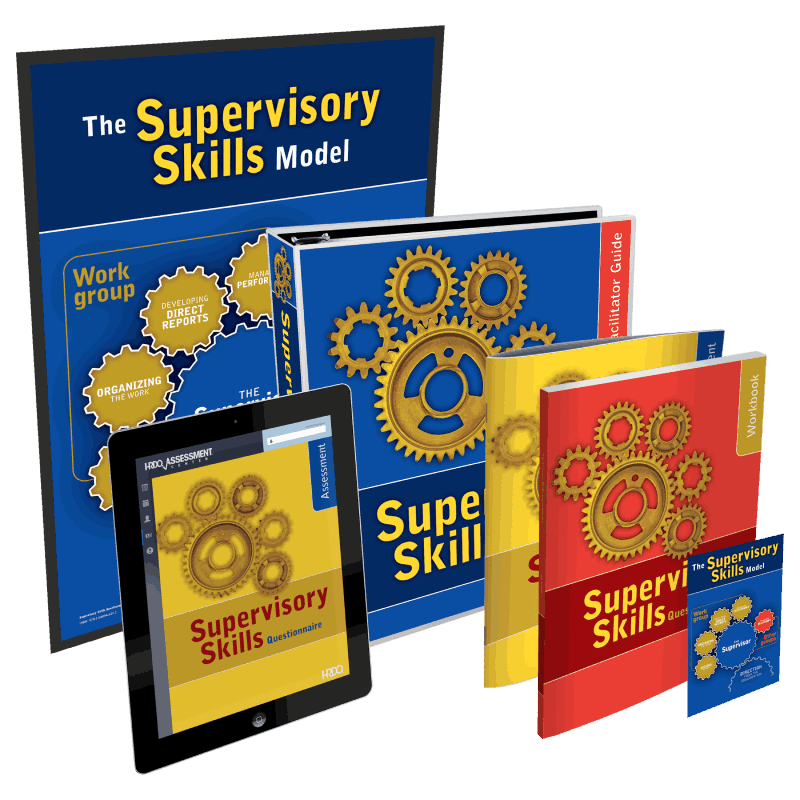
- Improve supervisor skills
- Measure performance
- Discover skill strengths
Table of Contents
Why are supervisor skills essential, effective communication, strong leadership, priority management, diversity awareness, guiding workloads, workload organization, staff development, managing performance, interpersonal skills, openness to advice, willingness to learn, advanced supervisory skills, delegating tasks, constructive criticism, adaptability.
These proficiencies are essential because they set the tone for the workplace. If someone is a good supervisor , they can perform their job more efficiently and gain more respect from their peers and subordinates. Learning all the management skills needed to be an effective leader can be challenging, but you should note a few essential items.
A "supervisor" is anyone who directs and is responsible for the work of others. This person is familiar with their staff's daily work and receives direction from those who are responsible for decision-making and more significant strategy shifts for the company. Overall, they need to be able to:
- Communicate well with diverse groups in and out of the organization
- Utilize problem-solving skills, creativity, and critical thinking
- Demonstrate qualities like empathy, support, and concern
- Be able to develop their new employees based on their strengths
There are 15 essential skills supervisors need to possess to do their job as successfully as possible.
Communication skills are one of a good supervisor's most important assets. They need to assign projects clearly and communicate important information to staff regularly. Transparency is essential, and supervisors should strive to keep an open door for employees to approach them with their needs or issues.
Conflict can happen in a work environment. A good manager recognizes this and creates an effective method of minimizing friction and dealing with it when it takes place. Being a good listener and mediator is also vital in tricky situations.
The supervisor should serve as an example to their staff. They must assert leadership and make their employees want to follow them as they take their organization through regular business changes. A strong leader will encourage their group, improve teamwork and lead the way to success.
There are many tasks that a supervisor needs to deal with that require excellent critical thinking skills. With a high-level position comes more responsibilities and more decisions to be made. Critical thinking skills make the decision process more manageable.
Time management is essential in a business with deadlines and deliverables. Being able to juggle timelines and meet goals regularly means supervisors must be aware of when things need to be completed and how much time it takes to do them – plus getting their team to work on the same timeline.
Managers must also be able to structure the workload to ensure all projects are given the correct amount of priority and that high-priority projects are finished first. They need to be familiar with all company goals in order to determine which tasks are the most important.
Diversity is crucial in organizations today. A great manager recognizes this and encourages their company to continue working on company diversity and inclusion (D&I). The supervisor may even decide to join the team that works on D&I to help with the initiative more.
When issues in the workplace arise, supervisors should use their skills to handle them. Excellent problem-solving skills help a manager assess the situation at hand and develop an effective plan on how to tackle it.
Supervisors need to guide the overall work of their employees. Their view of work must be broader than that of their employees. Being an effective supervisor means understanding the bigger picture and adjusting work to accommodate that. They must give direction and carry it out purposefully, plan the workflow and give active direction to staff members.
Constantly changing office priorities means that a supervisor must continually organize the work. They need to consider the demands placed on the employees when they are organizing the workload. They should also recognize the employees' needs and listen to feedback when making work and organizational decisions.
A large role of a supervisor is developing personnel. Thorough and strategic employee development is essential for happy and satisfied staff, so supervisors should get to know their subordinates' strengths and ambitions so they can help them grow as valuable assets within the company. They should have a plan for the employee's development and set goals for how they can work on their weaknesses and contribute to projects where they are likely to succeed.
The supervisor is responsible for managing employee performance. They should continually coach direct reports on achieving their potential and set appropriate expectations. Managers should look at future projects, determine how well the employee should perform, and manage them accordingly. Occasionally, there may be performance problems with a team member. In this situation, the supervisor must calmly approach the issue and discuss a plan to overcome it.
Developing and maintaining good relationships with other departments is also vital. The supervisor wants to ensure both their employees and the organization meet their goals, so they should recognize the importance of working together cohesively.
Supervisors should look to their peers for advice and guidance when faced with a problem outside of their expertise. Issues can be assuaged when they have a mentor in their organization or field willing to offer advice when requested.
The last trait that supervisors should have is the willingness to learn and grow. While their team is learning, they too should be developing themselves in their careers and trying to learn as much as they can about both their subject matter and about supervising their employees in the best way possible.
You have the 15 essential leadership qualities of a good supervisor down, but that doesn’t mean that you can stop the learning there. Good leadership requires a continuous refining of your skills and qualities in order to more effectively lead your team and create a positive working environment.
Everyone knows about cognitive intelligence (IQ) but what about emotional intelligence (EQ)? Emotional intelligence is the ability to understand yourself and others. It allows you to be aware of your own emotions, understand how to manage them, and know how to handle interpersonal relations. Developing and nurturing your capacity for emotional intelligence by being self-aware and motivated allows you to interact with people on a more personal and meaningful level, leading to greater harmony in the workplace and increased productivity as communication and personal needs are met.
Delegating tasks is good not only for you but for those you work with. One of the keys to being a great leader is being able to delegate tasks to others. It relieves some of your own workload, but more importantly, it gives people the opportunity to expand their skill set and grow in their careers as they try their hand at new things. The important thing to remember is to make sure that the tasks you delegate to each individual are truly meant to help them learn and grow.
Being a good supervisor means you can adequately evaluate the efforts of your employees and provide tips on where they could improve and things that could help them improve. It's crucial to remember that this process is not about tearing the employee down, which can lead to a lack of motivation and engagement. The whole purpose is to build up the employee and unlock their greater potential. Likewise, c onstructive criticism is a two-way street. It’s not always about giving, but it’s also about receiving. Y ou may be lacking in certain areas as well, as we all are, and being able to take constructive criticism is equally important and will help you grow into a more successful supervisor.
While most people may not actually like change, being able to meet it head-on and roll with it is a skill that will serve supervisors well. Supervisors are constantly being met with a changing business landscape and the need to improve and build upon performance, relationships, goals, processes, and more. Supervisors who can adapt their methods and confidently lead change attain success not only for themselves but for their teams.
With these essential core competencies and additional advanced competencies, managers can effectively solve any supervisory issues they may encounter and prepare for future situations that require the oversight of a knowledgeable and dedicated supervisor.
Need more help with improving your supervisor skills? With the Supervisory Skills Questionnaire , you'll learn how great supervisors are the vital link between your organization and others that you work with. The product is a combination of assessment, employee feedback, workbooks, and a half-day supervisory skills training program that equips supervisors with the skills they need to tackle the everyday challenges they face in the workplace.
Sumair Afzal - July 13, 2023 Very informative and helpful for grooming leading skills.
Aldo Arteaga - June 29, 2023 These core skills look more like those of a manager than a supervisor. A core skill of a supervisor is ‘delegation’ which I assume you might think is inside time management but, in my opinion, should be a core skill by itself.
Rhys Tay - June 15, 2023 Supervisor skills should consider the personality of himself or herself and adjust the work environment in a way fix that person personality. That let go those thinking where the norms is not accepted and improving the personality that will help the company’s achieve the objectives.
ashar azeem - July 1, 2022 very informative
Ruth Nyumbu - June 1, 2022 Thank you for sharing. It’s helpful
Leave a comment
Comments must be approved before appearing
* Required fields
About our author
Bradford r. glaser.
Brad is President and CEO of HRDQ, a publisher of soft-skills learning solutions, and HRDQ-U, an online community for learning professionals hosting webinars, workshops, and podcasts. His 35+ years of experience in adult learning and development have fostered his passion for improving the performance of organizations, teams, and individuals.
Related Blog Posts from HRDQ
Elevating the mental health of leaders: optimizing their unlimited worth.
HRDQ-U presents a live webinar event on Wednesday, October 19, 2022 at 2:00pm EST. Brought to you by HRDQ-U and prese...
- View this post
Intros and Icebreakers for Amazing Training Sessions
First impressions matter, whether you’re walking into a social gala or beginning a new training seminar. How you open...
What Is the Player-Coach Model? Definition, Tips, and More
When someone with a long history in their job starts coaching their friends – instead of just playing – it reflects t...
What is Bureaucratic Management Theory, and How Do You Use It?
Big companies are really good at keeping everything running smoothly. They have a way of handling tasks that organize...
A Guide to Visual Versus Auditory Learning Preferences
If you want to improve your work training, you'll need to think about how people like to learn, like by watching or l...
Can You Apply Piaget's Theory of Education to Business?
Jean Piaget's reach learned how kids form the knowledge of the world they live in. Thanks to him, we have a whole new...
What Are the Core Ideas of Dewey's Education Theory?
John Dewey turned how we learn, promoting practical involvement in education. Forget the old days of just storing fac...
The Ultimate Guide to Describing Your Company Culture
Why do job ads grab our attention? Why do we get all excited when recruiters reach out? It all comes down to how a co...
Legacy Leadership: What Is It and How Does the Model Work?
Have you ever considered the mark you'll leave as a leader? The deeds, decisions, and drive you bring to the table al...
The 6 Stages of Moral Development: A Comprehensive Guide
Have you ever considered the reasons behind your choices? Whether you're picking your breakfast or making big-figure ...
Effective Teamwork: The Conditions, Skills, and Components
Creating an environment where teams can be truly effective and successful requires certain conditions, components, an...
[Guide] Mapping the Path of Erikson's Developmental Process
Imagine a map that spreads from when you're born until you're gray and old. It's a map that shows the complicated pro...
How to Write an Employee Warning (With Letter Template!)
Handling employee discipline is no picnic, but it's essential to running a successful team. With tips, ideas, and a t...
How to Master the STAR Method: How Does It Work?
Do job interviews get you feeling tied up in knots? Why not give the STAR method a try? This technique cuts through t...
What Is the Johari Window Model and How Does It Work?
There's a powerful tool from psychology that helps us learn about ourselves and how others see us; they call it the J...
Working with Micromanagers: Signs, Tips, and What to Do
Micromanagement. You've likely heard of it. It's when a boss on your team goes overboard with control. They look into...
A Beginner's Guide to the "Big 5" Personality Traits
The "Big 5" personality traits spark a lot of interest. This idea comes straight from important psychological studies...
Enneagram Guide: Types, Tests, Assessments & More
The Enneagram test is like a key to understanding human personality. It shows everyone's unique strengths, weaknesses...
Guide to Employee Self-Evaluation Tips (+Free Examples)
The usefulness of self-evaluation isn't strictly tied to preparations for performance reviews. It's about nudging emp...
Merit Increases in 2024: Everything You Need to Know
Significant changes are happening in the business world because of pay increases based on excellent job performance. ...
Guide: What Are the Seven Barriers to Communication?
Clear interaction forms an essential foundation for personal and business partnerships – it isn't always easy, though...
Hiring Guide: What Is a TMS (Talent Management System)?
Good human resources management keeps a business ticking, right? A Talent Management System (TMS) is often the go-to ...
Key Concepts in Bolman and Deal's Four-Frame Model
Workplace dynamics can get tricky at times. One tool that can help is Bolman and Deal's Four-Frame Model. Have you ev...
The Key Principles of the GROW Model Coaching Process
The GROW strategy is deeply involved in personal coaching and personal growth. Just imagine you're on a journey. Each...
[Guide] What Is Vroom's Expectancy Theory of Motivation?
Victor H. Vroom gives us the well-known Expectancy Theory of Motivation. He offers a clear explanation of how people ...
10 Common Examples of Workplace Conflicts (And Solutions)
The presence of conflict in the workplace isn't necessarily a bad thing. It can be tempting to try and avoid conflict...
The GROW Model: Principles and Benefits for Personal Growth
Porter's five forces: definition, examples & case studies.
We're going to focus on something called Porter's Five Forces. This is a useful strategy created by Michael E. Porter...
6 Strategies to Effectively Manage Complexity in the Workplace
Balancing many tasks in your work life sometimes feels like navigating a swarm of chaotic bees - intense and turbulen...
Employee Loyalty: Why It's The Key to a Thriving Business
Have you ever been on a team with no genuine interest or care? It's like being lost at sea during a storm with no pla...
Essential Elements of Lewin's Leadership Theory: A Breakdown
If you are in a leadership position, effectively guiding your team is paramount, regardless of whether you're just be...
Mastering Leadership Shadow: Easy Steps to Success
Have you ever paused to consider the impact of your leadership shadow? Like a towering skyscraper, it casts an immens...
Blinkist vs. getAbstract: Which is a Better Book Summary App?
Some of the most successful people in history and in our modern times have been avid readers– Warren Buffett is said ...
PESTEL (PEST) Analysis: How to Evaluate External Influences
Change in your organization can be driven by a wide variety of factors, some of which are internal while others are e...
15 Effective Strategies to Combat Workplace Complacency
When an employee goes into autopilot and is just going through the motions, they've become complacent. Not only does ...
The Ten Types of Discrimination: Essential Employer Guide
If an employer discriminates against an employee, it means that they are treating them differently than other employe...
Exploring Work Ethic: How to Define and Showcase It
Every company is looking to bring in team members who are loyal, responsible, dependable, and go the extra mile. When...
Addressing Employee Absconding and The Top 10 Reasons
When an employee decides to leave your organization, there is a standard procedure they are expected to follow. Many ...
8 Powerful Examples of Employee Empowerment at Work
Empowering your employees is something that is often discussed in the business world. You can achieve countless benef...
Optimism vs Pessimism: How to Balance Your Team's Attitude
As a business owner or manager, you likely often think about how you can boost team productivity in your organization...
Employee Connection Tips: How to Strategically Place Workers
Composing a successful team requires selecting individuals with the right skills and knowledge to help the team achie...
What Are The 10 Essential Soft Skills for Project Management?
Project managers are responsible for initiating, executing, and finishing projects– following projects from ideation ...
Born Leader vs. Made Leader and The Difference Between Them
Are great leaders born with the qualities they need to succeed, or are they something that can be developed through t...
15 Online Whiteboard Tools for Training Online (Free and Paid)
In the world of virtual training, online whiteboard tools have genuinely been a game changer. Team leaders are able t...
Instructional Design Guide: What Is It and How Does It Work?
If you're interested in improving efficiency and performance in your workplace, one of the most effective things you ...
[Guide] What Are The Different Employee Onboarding Phases?
For many organizations, the onboarding process focuses entirely on administrative tasks, such as completing new hire ...
What Is a Learning Management System, and Do You Need One?
The earliest learning management systems were developed in the late 1990s, but these platforms have evolved significa...
Accountability vs. Responsibility: Striking the Balance for Success
Accountability and responsibility are words often used interchangeably, but they differ in several important ways. Fo...
What is a Berke Assessment? Questions, FAQs, Alternatives & More
During the hiring process, recruitment teams are tasked with gathering as much information as possible regarding the ...
Assessing & Enhancing Listening Maturity: A Comprehensive Guide
Effective communication is an essential building block of all successful businesses, and listening is a vital compone...
Intercultural Management Guide: What Is It and Why Is It Important?
Organizations of all sizes can benefit from implementing intercultural management initiatives, yet many vastly undere...
Developing Your Team With Learning, Training, and Education
It's easy for teams to get so bogged down in the day-in, day-out of necessary tasks that they can't look forward towa...

- SUGGESTED TOPICS
- The Magazine
- Newsletters
- Managing Yourself
- Managing Teams
- Work-life Balance
- The Big Idea
- Data & Visuals
- Reading Lists
- Case Selections
- HBR Learning
- Topic Feeds
- Account Settings
- Email Preferences
The Secret to Becoming a Better Manager
- Edward Sullivan

Lead from the heart.
When people on your team are quitting, not performing, or seeming disengaged, what should you do? Instead of sitting them down, reviewing their goal progress, and telling them to work harder, channel your inner gardener. That means, taking ownership of meeting your teams’ physical, emotional, and environmental needs and getting to the root cause of the underlying issues.
- Take the lead: Not everyone on your team will be able to articulate exactly what they need to feel creative, engaged, or challenged. Most of us aren’t consciously aware that we’re not getting a need met until someone else draws our attention to it. It’s best to set the example and approach these discussions with vulnerability.
- Probe and explore: Our actions are motivated by the fulfillment of certain needs which are usually a unique mix of our physical, emotional, and environmental, and largely depends on our individual preferences. Ask your team if they’re taking care of themselves. Do they have a mindfulness regimen? How are they feeling working with the team? How are they feeling about their office or workspace?
- Take action: Depending on what you’re hearing from your team, you might advocate to senior leadership for a new meditation or nap room at the office, gym membership stipends, making coaching available, or mental-health conversations. But remember, all of your noble investments in new programs and benefits to support people’s needs will be for naught if they have no time to take advantage of them. Set clear expectations around work and non-work hours, and seek out workflows in the business that cause unnecessary stress and urgency.
Where your work meets your life. See more from Ascend here .
Imagine you’re a gardener, and you find one of your plants in a rather pathetic state one morning. Perhaps the leaves have turned yellow, wilted, or shriveled up. Maybe the stems are brittle, and there are roots at the surface. What would you do? Common sense tells you to figure out why the plant is in such a distressed state so you can do something about it. Did you not give it enough water? Or give it too much water? Did you not fertilize the soil properly? Was it kept in the sunlight for too long? Or not long enough?
- John Baird has been considered one of the premier executive coaches in Silicon Valley for over 25 years. He built his career coaching in the C-Suite at companies ranging from Apple and Nike to start-ups like DoorDash and MasterClass. He earned a PhD in Organizational Leadership from Purdue University. He is currently Founder & Chairman of the renowned executive coaching consultancy Velocity.
- Edward Sullivan has been coaching and advising start-up founders, Fortune 10 executives, and heads of state for over 15 years. His clients include executives from Google, Salesforce, Slack, and dozens of other fast-growth companies. He holds an MBA from Wharton and an MPA from the Harvard Kennedy School. Edward is CEO & President of the renowned executive coaching consultancy Velocity.
Partner Center

24 Key Qualities of a Good Supervisor (Traits and Skills)
By Status.net Editorial Team on February 6, 2024 — 10 minutes to read
Communication Skills
Effective supervisors are masters at conveying information and understanding the needs of their team. They ensure clarity and build trust through consistent and thoughtful communication.
1. Active Listening
Listening isn’t just about hearing words; it’s about fully grasping the speaker’s message and context. For instance, when an employee is sharing a concern, you listen to not only to the content but also to the underlying emotions to comprehend the full message. Another example is during team meetings where you show attentiveness by summarizing points made by your colleagues, indicating that you value their input and understand their perspectives.
2. Clear Expression
You articulate instructions and expectations using simple language to eliminate confusion. For example, when assigning a task, instead of just mentioning the task, you also clearly define the deadline and quality standards expected. Or, when discussing complex projects, you break down tasks into smaller, more manageable pieces, which makes it easier for your team to digest and act upon the information.
3. Feedback Delivery
The way you provide feedback can significantly influence your team’s morale and productivity. Instead of making vague statements like “you need to improve,” you give specific, actionable advice such as “increasing your report accuracy will help the team meet its quality objectives.” When recognizing good performance, you highlight particular achievements, like “your comprehensive market analysis gave us valuable insights that led to a successful campaign.”
Leadership and Vision
A good supervisor leads by example and sets clear, achievable visions for their team. They steer their colleagues towards a well-defined goal and are adept at making sound decisions.
4. Inspiring Confidence
Inspiring confidence means you display a level of certainty and positivity that your team can feel. For instance, when facing a critical project, you reassure your team by breaking down the project into manageable tasks and showcasing your trust in their abilities. By recognizing and praising team members for their contributions, you build their self-esteem, motivating them to perform at their best.
5. Strategic Planning
Strategic planning requires you to identify long-term goals and the steps necessary to achieve them. You might analyze market trends to set realistic targets for your team, or you might develop a workflow that maximizes team efficiency. For example, after noticing a pattern of increased client demand, you revamp your team’s schedule to ensure deadlines are met.
6. Decision Making
Effective decision making entails choosing the best course of action, often under pressure. You might weigh the pros and cons of a new software before implementing it to streamline team operations, or decide to reallocate resources to where they’re needed most, such as moving staff from a slow project to a busier one. Your ability to act decisively impacts team success and demonstrates your leadership.
Emotional Intelligence
Emotional intelligence is the ability to perceive, control, and assess emotions. As a supervisor, possessing high emotional intelligence can significantly improve your team’s morale and productivity.
Empathy means understanding the feelings of others and responding with care. If your employee is facing personal challenges, taking time to listen and showing genuine concern can make a big difference. For example, you might rearrange their workload temporarily or provide resources for support. Or, if a team member is excited about a personal milestone, sharing in their happiness can boost team solidarity.
8. Self-Awareness
Self-awareness is recognizing your own emotions and how they affect your behaviors and thoughts. An example is when you notice your frustration during a meeting and choose to take a moment before responding to avoid escalation. Another instance is being aware of your strengths and limitations when taking on projects, ensuring you delegate tasks effectively and set your team up for success.
9. Handling Conflict
Handling conflict effectively requires recognizing the emotions involved and navigating towards a resolution. When two team members disagree, you can mediate by acknowledging each side’s perspective and guiding them towards a compromise. For instance, if there’s a clash over project direction, you might host a meeting to discuss options openly and come to a democratic decision. Or, if tension is high between departments, you can promote interdepartmental collaboration to build empathy and understanding.
Team Management
10. delegation.
You enhance team efficiency when you delegate tasks based on each member’s strengths and skills. Example: Assigning the quarterly financial report to your accountant who has a keen eye for detail and deadlines. Another is giving the responsibility of leading a project team to a staff member who has consistently shown leadership qualities and excellent problem-solving skills.
11. Task Coordination
Keeping your team in sync with ongoing projects and deadlines means managing the workflow so tasks are completed in a logical order. Example: You set up weekly meetings to update the team on project progress and adjust timelines accordingly. Additionally, you use project management software to keep everyone informed of their responsibilities and the status of their tasks.
12. Performance Monitoring
You ensure that the team is on track and individuals are performing to expectations by regularly evaluating their work. Example: You hold 1-on-1 meetings to give personalized feedback or use performance metrics to provide concrete data about their work. Another case could be recognizing exceptional work in team meetings, reinforcing that high performance is noticed and valued.
Mentorship and Development
13. coaching team members.
As a supervisor, you have the chance to lead by example. This means showing your team how to handle complex projects while still respecting deadlines and quality standards. For instance, if a team member struggles with time management, you might sit down with them to create a tailored daily plan. Another example is conducting regular one-on-one meetings where you discuss specific challenges and provide feedback that helps your team members improve their performance.
14. Encouraging Professional Growth
You should create opportunities for your team to learn and advance in their careers. This could involve setting aside budget for workshops or online courses. Encourage your team members to attend industry conferences, which can be a turning point in their professional development. Offer support when someone expresses interest in acquiring a new certification that could benefit their role and the company.
15. Recognizing Potential
Seeing someone’s untapped potential is a true skill, and guiding them to realize it is even more rewarding. If you notice a team member has a knack for public speaking, you might suggest they lead the next team presentation. When someone consistently goes above and beyond, you could recommend them for a leadership training program, paving the way for a future managerial role. Recognizing and acting on these opportunities helps individuals feel valued and can significantly boost morale.

Adaptability
In the dynamic landscape of business, your ability to adapt to changing conditions and unexpected challenges is pivotal for supervisory success. Let’s break down what this entails through key adaptability traits.
16. Openness to Change
You’ll demonstrate your adaptability through a willingness to embrace new situations and alter your methods when necessary. For instance, if your company undergoes a merger, you may need to integrate new staff or adopt different procedures quickly. You might also encounter shifts in market trends that require a change in your team’s direction to stay competitive. Your openness in these scenarios shows not only flexibility but also sets a positive example for your team to follow.
17. Problem Solving
Your adaptability manifests in problem-solving when unforeseen issues arise. Say a critical software your team relies on fails; you need to identify alternative solutions or workarounds until the issue is resolved. Another example could be losing a key team member unexpectedly, where you’ll step up to redistribute the workload efficiently while maintaining morale and productivity.
18. Innovation
Encouraging innovation is part of being an adaptable supervisor. For instance, seeking out new technologies to streamline processes shows foresight and adaptability. Similarly, if you’re faced with budget cuts, rather than compromising on quality, you might champion the adoption of cost-effective practices or find inventive ways to do more with less, such as implementing cross-training among team members to enhance versatility.
Accountability
Accountability in a supervisory role means you take ownership of your actions and decisions, and ensure that they align with the broader goals of your team and organization.
19. Setting Expectations
As a supervisor, you must clearly define what you expect from each team member. For example, if you need a report by Friday, make it known upfront and provide the specifics on format and content. Another aspect is defining quality standards, so if you expect customer queries to be resolved within 24 hours, you must communicate this to your team explicitly.
20. Follow-Through
Following through on commitments is a tangible demonstration of accountability. If you arrange a meeting to discuss project progress, ensure you are there on time and prepared. When you promise to provide resources to your team, work diligently to deliver them as promised. An example includes supporting a team member’s proposal by advocating for it in a management meeting.
21. Taking Responsibility
Taking responsibility is integral to good supervision. When mistakes happen, acknowledge them and focus on solutions rather than assigning blame. For instance, if your team misses a deadline, analyze the breakdown together and identify steps to prevent future occurrences. Own up to your part in any setbacks and use them as learning opportunities to improve team performance moving forward.
Organizational Skills
Effective supervisors excel in organizing their tasks, team, and environment. Good organizational skills include efficient time management, strategic resource allocation, and sensible prioritization, all of which contribute to a smooth-running workplace.
22. Time Management
You understand that every minute counts when leading a team. Through time management, you adeptly schedule meetings to avoid overlapping with peak productivity hours. For instance, you might hold brief, standing morning huddles to set the day’s agenda, ensuring everyone knows their tasks without eating into crucial working time. You might also use digital calendars to track deadlines and appointments, allowing you and your team to prepare in advance.
23. Resource Allocation
Allocation of resources is where you shine by assigning the right personnel to the appropriate tasks. Imagine you’re working on a project that needs both creative input and analytical rigor. You assign the creative part to your most artistic team member, while the data analysis goes to the staffer with a knack for numbers. Additionally, you ensure that office supplies and equipment are accessible to those who need them most, avoiding last-minute scrambles before big presentations.
24. Prioritization
Prioritization means knowing which tasks will drive the most value and tackling them first. You identify key deliverables and set milestones. For example, ahead of a product launch, you ensure that the marketing materials are ready before fine-tuning minor website adjustments. This also extends to dealing with customer queries, where you might prioritize urgent complaints to maintain service quality and client satisfaction.
Frequently Asked Questions
How can effective communication skills benefit a supervisor in their role.
Good communication skills allow you to convey your ideas and expectations clearly, leading to better understanding and teamwork. For example, you might use open-ended questions to encourage dialogue or regularly hold team meetings to ensure everyone is on the same page.
Can you provide examples of leadership strategies that a successful supervisor might use?
A successful supervisor might use transformational leadership, which includes motivating and empowering your team to achieve more than they thought possible. An example would be setting challenging but attainable goals and celebrating achievements to motivate team members.
What are some examples of the ways a supervisor can demonstrate organizational skills?
Demonstrating organizational skills could mean maintaining a well-organized schedule that balances team workload effectively. For instance, you might use project management tools to delegate tasks and track progress, ensuring deadlines are met without overwhelming your team.
How does a positive attitude impact the performance of a supervisor and their team?
A positive attitude can be infectious, leading to an uplifting work environment. As a supervisor, showing optimism in the face of challenges can instill confidence in your team and encourage them to approach tasks with a can-do mindset.
In what ways can a supervisor’s ability to resolve conflicts contribute to a productive workplace?
Your ability to resolve conflicts can maintain harmony and collaboration among team members. For example, by mediating a disagreement and finding a compromise, you help ensure that minor issues don’t escalate and distract from work goals.
Can you give examples of how a supervisor can use their problem-solving skills effectively?
You can demonstrate problem-solving skills by actively listening to concerns, analyzing the situation, and identifying the root cause. For example, if there’s a bottleneck in production, you could redesign the workflow to eliminate inefficiency.
- 20 Key Traits: List of Desirable Skills of a Good Manager
- Qualities of a Good Employee (6 Key Traits with Examples)
- 8 Administrative Assistant Skills (Desired Qualities)
- 70 Example Phrases: Key Marketing Skills for Your Resume
- 50 Examples of Detail-Oriented Traits and Skills to Put on a Resume
- Good Qualities in a Person: Top Admirable Traits (Examples)
- PRO Courses Guides New Tech Help Pro Expert Videos About wikiHow Pro Upgrade Sign In
- EDIT Edit this Article
- EXPLORE Tech Help Pro About Us Random Article Quizzes Request a New Article Community Dashboard This Or That Game Popular Categories Arts and Entertainment Artwork Books Movies Computers and Electronics Computers Phone Skills Technology Hacks Health Men's Health Mental Health Women's Health Relationships Dating Love Relationship Issues Hobbies and Crafts Crafts Drawing Games Education & Communication Communication Skills Personal Development Studying Personal Care and Style Fashion Hair Care Personal Hygiene Youth Personal Care School Stuff Dating All Categories Arts and Entertainment Finance and Business Home and Garden Relationship Quizzes Cars & Other Vehicles Food and Entertaining Personal Care and Style Sports and Fitness Computers and Electronics Health Pets and Animals Travel Education & Communication Hobbies and Crafts Philosophy and Religion Work World Family Life Holidays and Traditions Relationships Youth
- Browse Articles
- Learn Something New
- Quizzes Hot
- This Or That Game
- Train Your Brain
- Explore More
- Support wikiHow
- About wikiHow
- Log in / Sign up
- Workplace Management Skills
How to Be an Effective Supervisor
Last Updated: November 12, 2023 Approved
This article was co-authored by Elizabeth Douglas . Elizabeth Douglas is the CEO of wikiHow. Elizabeth has over 15 years of experience working and managing teams in the tech industry. She has held roles in multiple areas, including computer engineering, user experience, and product management. She received her BS in Computer Science and her Master of Business Administration (MBA) from Stanford University. There are 8 references cited in this article, which can be found at the bottom of the page. wikiHow marks an article as reader-approved once it receives enough positive feedback. This article received 15 testimonials and 89% of readers who voted found it helpful, earning it our reader-approved status. This article has been viewed 376,066 times.
Effective supervisors are necessary in all settings where employees need guidance and supervision to complete tasks, serve customers, and meet deadlines. A skilled supervisor is an effective communicator, problem-solver and employee motivator. In order to be a good leader and get the most out of all of your employees, you need to have insight into their strengths and developmental needs. You also need to have a clear set of expectations and goals.
Gaining Credibility

- Keep in mind that you were hired to be a supervisor because your boss believes that you are capable of doing the job! Now you just have to prove your boss right.
- Don't let yourself believe that bosses never make mistakes. Nobody expects you to be perfect except yourself.

- Remember not to let your new-found power go to your head. It's important to respect your employees if you want them to respect you in return.
- Your attitude is just as important as your actions. Always be friendly and professional. [3] X Research source

- Try to keep your emotions under control as much as possible.
- Always treat employees fairly, and don't favor one over another.

- You also need to be able to adapt your management style to the needs of different employees. Some employees may flourish under hands-on management, while others may benefit from more freedom. It is your responsibility to recognize these needs and react accordingly.
- This does not mean that you should have different standards for different employees in the same role. While you may want to customize your approach to each employee's working style, you still must be consistent in your expectations and disciplinary measures.

Getting the Most Out of Your Team

- Make sure you take the time to get to know all of your employees, and let them know that you are available to talk to them whenever necessary. [8] X Research source
- Communication involves listening as well as talking, so be open to listening to whatever input your employees have for you. When you give workers your undivided attention, they feel respected and are more willing to listen to your guidance. Strictly giving orders without listening can erode worker commitment and enthusiasm.
- Avoid lecturing workers or sending directives by way of wordy emails. Think about the most important messages you want to convey and communicate them face-to-face or over the phone. Put thought into your email communications to ensure that they are clear, concise, and respectful.
- Regular meetings with employees will give you the opportunity to ask them about the projects they are working on, hear worker grievances and triumphs, discuss team successes, and brainstorm solutions to new problems.
- Always be responsive by answering your employees' emails and returning their calls promptly. [9] X Research source
- Multitasking is very convenient in today's busy world, but sometimes it just doesn't work. Let your employees know that you value their time by putting all distractions aside when you meet with them.

- You can still expect excellence out of your employees, as long as that excellence is actually attainable. [11] X Research source
- Take the time to talk to your employees about your expectations and get their feedback. If you encourage an honest discussion, your employees are more likely to let you know if your expectations seem unreasonable.
- You should have a good understanding of the work volume that already exists and the amount of time it will take your employees to finish a specific project before setting a deadline. If you don't have the right information, you risk over-committing your team.

- Remember that you are still ultimately responsible for your employees' work, even if you delegate specific tasks to others. If you don't completely trust your employees to do the work on their own, establish some kind of review process until you think they can handle it.

- Some supervisors feel threatened by successful employees, but this will only hinder your ability to be an effective supervisor. You should be proud of your high-performing employees, not jealous. [14] X Research source

- Pay attention to the unique talents and skills of each worker and utilize those strengths for the benefit of the project or company. For example, a worker may be excellent on the phones but a slow typist. Find opportunities for her to apply her phone skills to building company connections, selling products, or serving customers.
- Whenever possible, offer training to employees to help them learn new skills. A slow typist, for example, can be encouraged to take a typing class or be assigned additional typing tasks to improve her skills.
- Avoid drawing attention to weaknesses unnecessarily. Excessive focus on employee weaknesses can result in discouragement and low employee morale.
- Use employee reviews as an opportunity to both praise your employees for their strengths and to offer constructive criticism on what they can do better. Part of being an effective manager is assisting employees to transform their weaknesses into competencies. The first step is creating awareness of an area that needs improvement.
- Don't wait for your employee's next yearly review if you can offer some constructive criticism today!

- Your employees will not respect you if they see you as someone who runs away in the face of conflict.
- When having a difficult conversation with an employee, always focus on objective observations and avoid making accusations. [17] X Research source
Meeting the Demands

- Keep in mind that long-term solutions are always better than short-term solutions, even if they are harder to implement. [20] X Research source
- Being an effective problem solver means staying focused on the facts of the situation and thinking of creative solutions. Avoid focusing on emotions and blame. Think of the necessary steps for helping employees to regain composure and resume the task at hand.

- This doesn't mean overwhelming your team or taking on more than you can handle, but it does mean stepping outside of your comfort zone every once in a while. Encourage employees to do the same by offering them the opportunity to work on projects that are unfamiliar to them.

- Be sure to listen to your team if they tell you the goals are not attainable. There's no reason a goal can't be modified.
- The better your sense is of how much your team has to accomplish in a certain amount of time, the better you will understand how much additional work they are actually able to take on.

- The importance of feedback cannot be overstated. Make sure you let your employees know how they are doing, whether good or bad.

- Automate menial tasks whenever possible, encouraging employees to focus more on productive and engaging projects.

- Keep in mind that negative energy will trickle down to your entire team, so be sure to set the right tone.
Expert Q&A

- It's critical that your employees trust you, but that won't happen if you don't show them that you trust them too. [23] X Research source Thanks Helpful 0 Not Helpful 0
- It's important to pick your battles. Supervisors face a lot of conflicts every day. Thanks Helpful 2 Not Helpful 0
- Don't take yourself too seriously! You can still enjoy your job and encourage a fun work atmosphere. Thanks Helpful 1 Not Helpful 0

You Might Also Like

- ↑ https://www.psychologytoday.com/blog/smashing-the-brainblocks/201508/the-7-habits-highly-ineffective-people
- ↑ http://www.forbes.com/sites/victorlipman/2013/09/09/5-things-the-best-managers-do-and-dont-do/#6f93cf3d3edd
- ↑ http://www.entrepreneur.com/article/217801
- ↑ http://www.forbes.com/sites/glennllopis/2012/07/10/effective-managers-earn-trust-quickly-by-doing-5-things-well/2/#18084ef87214
- ↑ http://www.forbes.com/sites/victorlipman/2014/01/01/6-fundamentals-that-can-make-you-a-better-manager-in-2014/#7af39aaa5c05
- ↑ https://www.inc.com/peter-economy/7-keys-becoming-effective-manager.html
- ↑ http://www.entrepreneur.com/article/220133
- ↑ https://www.psychologytoday.com/blog/trust-the-new-workplace-currency/201408/7-new-realities-about-trust-every-supervisor-should
About This Article

To be an effective supervisor, be consistent with your rules and expectations so your employees know what they need to do to succeed. With that said, don't be afraid to change your approach or admit that you were wrong if things don't go as planned. Also, make an effort to communicate with your employees regularly to keep everyone on the same page. When you're setting expectations for your employees, make sure they're realistic and try to remember that perfection isn't attainable. For tips on meeting the demands of being a supervisor, scroll down! Did this summary help you? Yes No
- Send fan mail to authors
Reader Success Stories
Nooshin Noora
Jul 28, 2020
Did this article help you?

Jean Romane Sylverne
Aug 1, 2020
Annie Lewis-Phillip
Apr 8, 2017
Omar Mustafa
Jan 3, 2017
Babar Naseem
Apr 4, 2016

Featured Articles

Trending Articles

Watch Articles

- Terms of Use
- Privacy Policy
- Do Not Sell or Share My Info
- Not Selling Info
wikiHow Tech Help Pro:
Level up your tech skills and stay ahead of the curve

How to be a Great Supervisor Essay
- 2 Works Cited
The definition of what makes a perfect supervisor will of course vary in its definition and interpretation from person to person. However there are four main points that most people will agree upon that makes a supervisor a cut if you will above the rest. A supervisor should always strive to be as ethical and moral in his decisions as possible. This will lead his subordinates to respect his decisions more often even if they do not always agree with him. Another characteristic of a respectable supervisor is his ability to perform even the most menial of tasks to help gain the respect of his employees. A fundamental point of an excellent supervisor is to not be the boss of the employees but to be the leader of the employees. The last …show more content…
While we all have been taught this when we finally ascend to the level of supervisor something makes us want to make the people under us feel the same way we did under our supervisor so we start to give orders and command to our employees which reduces general morale in the company and leads to people quitting or doing less and poorer quality work for the business. Instead of giving orders to the employees a supervisor should work besides the employees to complete the job or project, instead of blaming people for failures in the project instead to work with the people who are failing to meet certain goals in the project, find out what is preventing them from meet the appointed goals, and to rectify the issues. The final mission if you will for a supervisor is to show his employees that he cares for them and wants them to succeed in the company. This is one of the quintessential but extremely hazardous thing for a supervisor to do since he has to open up somewhat to his employees and to get emotionally attached to them but at the same time has to be able to see what is best for the project as a whole and be able to terminate someone he or she has grown fond of over the years or months they have been working together. In summary the perfect supervisor in theory is possible but in reality is never attainable. While some have come very close they always will lack somewhat in one of these aspects. Either they will grow to attached to
Bsbwor502 Task 3
A good supervisor is firm and yet gentle with the employees. Providing continuous and constructive feedback to employees is a must for a person in any supervisory capacity. Supervisors who are helpful and appreciative of good work are much better in their capacity as
Theory And Practice Of Supervision
Kadushin describes a supervisor as someone "to whom authority is delegated to direct, coordinate, enhance, and evaluate on-the-job performance of the supervisees for whose work he/she is held accountable. In implementing this responsibility, the supervisor performs administrative, educational, and supportive functions in interaction with the supervisee in the context of a positive relationship" (Powell, 1993).
Compare and Contrast Essay Good Boss Bad Boss
A good boss generally leaves the employees to do his or her work, but is available to help the employee if needed. As a result, employees tend to be happier, more at ease, and more likely to be more productive in his or her work environment. There are many qualities that make up a good boss. A good boss cares about their job as well as the employees who work under them. It is important
Internship In Foster Care
I must note that I am lucky to have an amazing supervisor and direct supervisor. I do not have to worry about organizational challenges with them. They always created positive working environment, enhancing employee well-being at work, and have great
Effective Leadership Essay
In today’s competitive world, leadership skills are crucial for both personal and professional development. Leadership is an important function of management which helps an individual or a business to maximize efficiency and to achieve goals. Leadership has different meanings to various authors.Most commonly, leadership is defined as influence, that is, the art of influencing people so that they will strive willingly and enthusiastically toward the achievement of group goals. (Koontz). Leadership is the process of influencing the activities of either formal or informal group in the task of goal setting and goal achievement. A leader is one whose magnetic personality innervates people for some cause. Not by words, but by their actions is
Supervisors and Managers Responsibilities Essay
Many organizations and establishments have philosophies in how an organization is to be functioning and which positions are necessary to execute the plan. One of the crucial positions that make the establishment function is that of a Supervisor. The term supervisor is a word with Latin roots which means “to look over,” however, a supervisor is viewed as a person who is an immediate overseer to an employee at a workplace. The supervisor is the person an employee would directly report to for any work related situation. A supervisor plays an essential part of the management team that gives an organization purpose and leadership by being responsible for employees’ progress and productivity (Bittel & Newstrom, 1992).
Being a Good Leader Essay
- 6 Works Cited
Leadership is a term on which no one can develop a mutual consensus as it carries a different meaning for ach individual. Some people may consider a person as their leader who is capable of taking them away from hardships, some people may consider the one as their leader who is quite charismatic and can show them dreams of a bright future or some people may consider that man as a leader who can make them progress by devising wise strategies for them etc. There is, somehow, something very common in all the perspectives that are the philosophy behind the definition, which is related to choosing a best of the best person as their leader. Nobody wants to have a person as his leader who doesn’t have knowledge of the needs and aspirations of his
Become An Effective Leader Essay
My own experience in leadership has been achieved during the last three and a half years working at Lufthansa technic Malta. The company has been operating in Malta for the last 12 years in which there has been a rapid growth in the company operations creating opportunities and developments. For the last two years I’ve had the opportunity to start working as a shop leader, developing my skills and gaining
What Makes A Good Supervisor? Essay
A good supervisor will inspire, challenge, and motivate their employees. In addition, a supervisor has the ability to stay focused and is able see the big picture. However, one could possibly argue that the best quality that a good supervisor must possess is the skill to recognize the potential in others. Nevertheless, the most important skill a supervisor must possess is the ability to help those around realize their own potential.
Supervision and Management
Supervision should be planned and adopted to the changing conditions. It calls for good planning and organization.
Supervision and Leadership - Semester Research Paper Assignment
Problem employees inevitably surface in most workplaces and sometimes employers need to counsel their employees and on occasions employers must discipline the employee. In an organization top-management often formulate the standards that supervisors must use when they have to deal with problem employees. A supervisor must have the skills required to organize, staff, lead, and control which includes the ability and talent required to deal with problem employees.
Essay about Characteristics of a Good Leader
A good leader needs to have many particular characteristics. Some of these are obvious, such as that they care about what you are doing and always puts you before themselves. Also another trait of a good leader is that they always keep promises they make. Some of the subtle attributes of a good leader are that they do not hide behind bad news. Moreover, they are easy people to talk to and they have a good if not excellent sense of humor.
Condagra Training Objectives
The first-line supervisors were trained in how to be a leader of both individuals and teams. There was a need to train them in this because they may not have had any chance to practice
To Be a Good Leader Essay
- 4 Works Cited
To become a good leader, the person must be responsible, because no one wants an unreliable leader. The way a leader is responsible is by always being prepared and organized with all of the information needed on a moments notice for what is supposed to happen and also what might happen (Rich). The leader should be able to take notes on the directions that their boss told them and do the task without having to ask more questions; instead they would use their notes. It is the leaders’ responsibility to make sure that their team is on track with their project and that it is completed by its dead line
Essay about How to become a better leader
I believe good leaders have the desire and willpower to become an effective leader. Good leaders develop through a never ending process of self-study, education, training, and experience. I think one of a leaders’ main goals should be to inspire their workers into higher levels of teamwork, which can be acquired through continual work and study. Good leaders should constantly be working and studying to improve their leadership skills. Leadership is defined as a process by which a person influences others to accomplish an objective and directs the organization in a way that makes it more cohesive and coherent. Leaders carry out this process by applying their leadership attributes, such as beliefs, values, ethics, character, knowledge, and
Related Topics
- Productivity
- Business ethics
Supervisors’ Duties and Qualities Essay
Supervisors form an important part of organizations since they are tasked with overseeing and guiding junior staff to achieve set objectives. Therefore, an effective supervisor should be able to demonstrate leadership skills by bringing employees together to work as a team. This enables individuals to learn and work in an optimal environment that supports and cares for their needs in the workplace. In my case, my supervisor possesses time management skills, delegates appropriately, and communicates efficiently.
The management of time in the workplace is critical in handling operations since employees are human beings who have physical limitations. Therefore, my supervisor ensures that shifts are structured efficiently to provide adequate time for individuals to rest. More so, we are given the opportunity to change shifts and ask for permission whenever any unforeseen events occur. Apart from that, the delegation of activities is based on the supervisor’s knowledge on individual capacities and competencies. This ensures that people are paired in a manner that they can learn from each other and support overall organizational growth. For instance, I have had an opportunity to learn new things on the use of Electronic Health Records (EHR) systems through my supervisor. Lastly, communication is an important factor that helps my relationship with the supervisor by allowing significant interactions. This provides the opportunity to get advice and encouragement to go back to school and complete my studies.
Consequently, the relationship with my supervisor has grown to be an important aspect of my internship through the guidance provided. Working in such an environment continuously encourages me to continue with the path of creating a meaningful career in healthcare and motivates me to push forward each day. Their constant presence and leadership make the work environment an oasis of fulfillment and a pride of being part of such a team.
- Chicago (A-D)
- Chicago (N-B)
IvyPanda. (2023, May 25). Supervisors' Duties and Qualities. https://ivypanda.com/essays/supervisors-duties-and-qualities/
"Supervisors' Duties and Qualities." IvyPanda , 25 May 2023, ivypanda.com/essays/supervisors-duties-and-qualities/.
IvyPanda . (2023) 'Supervisors' Duties and Qualities'. 25 May.
IvyPanda . 2023. "Supervisors' Duties and Qualities." May 25, 2023. https://ivypanda.com/essays/supervisors-duties-and-qualities/.
1. IvyPanda . "Supervisors' Duties and Qualities." May 25, 2023. https://ivypanda.com/essays/supervisors-duties-and-qualities/.
Bibliography
IvyPanda . "Supervisors' Duties and Qualities." May 25, 2023. https://ivypanda.com/essays/supervisors-duties-and-qualities/.
- Paired Box 6 (PAX6) Analysis
- Jungle Fun by Sophie Harding
- "Ready Player One" Novel by Ernest Cline
- Teams and Managerial Communication
- The Employee-Supervisor Transition Tips
- Aspects of a Coding Audit Plan
- Management Positions: Knowledge, Skills and Duties
- Managing the Night Shift Overview
Effective Leadership: What Makes a Great Leader
01 what is effective leadership, 02 developing leadership skills: how to be a better leader, 03 seven expectations for leaders, 04 how to be an effective leader, 05 leadership vs. management, 06 what makes a successful team, 07 creating a leadership development plan, 08 our best leadership resources.
Subscribe to the CliftonStrengths Insights newsletter to succeed using strengths.
( * ) Required
This site is protected by reCAPTCHA and the Google Privacy Policy and Terms of Service apply.
Introduction
There may not be an "I" in team, but there is an "I" in disengaged.
What does this have to do with leadership and development? Well, regardless of what, why and where you lead, you -- as the leader -- are directly responsible for the engagement of those who follow you .
And engagement is supported by your culture, which you are also responsible for as a leader. This is why it's vital for leaders to set the right tone for the organization -- for the sake of engagement, culture and the employee experience.
Whether you're leading a family, a class or a corporation, leadership means inspiring others to achieve certain outcomes. And it's up to you to decide whether you are leading positively or negatively -- and whether you choose to focus on engagement or merely output.
"Improving your leadership begins with a focus on improving what you're already good at."

Leadership can often be equal parts high confidence and self-esteem and worrying if you're doing it right while continually searching for answers . Whether you're a leader in an organizational setting or have high influence in some other capacity, improving your leadership begins with a focus on what you're already good at .
We would call that leading with your strengths: the things that come naturally to you and that help you succeed daily. When you intentionally apply your strengths as a leader, that's when your life and the lives of those you lead begin to change.
This page will provide you with new ways to think about your role or position as a leader. Legitimate improvement begins with a refusal to ascribe to one-size-fits-all solutions. Stay with us, discover why your strengths matter and then learn to use yours to become a transformational leader.
Improving leadership is an idea that can be difficult to grasp in tactical or practical ways.
The first step to improving it is to define it.
Our leadership definition , in its simplest form, means the act of getting individuals aligned and moving in the same direction toward a desired outcome.

Picture this: a world where every leader knew what goals they wanted to achieve, knew how to get their followers working toward that goal and knew how to use their strengths to get there. The world would be a much different place, wouldn't it?
Effective leadership has a lot to do with inspiring, aligning and then activating -- but it doesn't end there.
A key to effective leadership is the ability to define outcomes, but then help individuals put their talents to use to get there. The best leaders know their people and are more aware of those people's strengths than they are of their weaknesses. Great leaders aren't blind to their own or others' weaknesses; they just know that their competitive edge lies within their strengths.
Let's put this into perspective.
Consider the owner of a successful bakery.
Let's call him Jim.

When Jim was in culinary school, he wanted to open a restaurant, but there was a problem. He was terrible at cooking. He burned every pasta dish and dried out every chicken entree. However, when it came to the art of baking, he excelled -- nobody was better.
Jim also had a natural knack for leadership, often pulling other students into his projects and helping them learn through his expertise -- whether it was people or pastries, he knew what he was doing.
And even better, he knew that what he had originally desired had changed.
Now, his friends and family wanted Jim to follow his original dream. His instructors offered him extra cooking lessons because they knew he could get better. His peers told him to work harder, saying, "Jim, we know you're good at baking. You're the best -- a natural! But forget that. Your dream is to cook. Just spend more time on that."
But he didn't listen. Jim opened his own bakery, hired full-time staff and grew a successful business.
From an outsider's perspective, it was easy to see what Jim should do.

The advice from Jim's inner circle wasn't great. Their intentions were, but they were ignoring natural excellence and emphasizing weakness in hopes of mediocrity.
It's the type of advice leaders fall prey to often. "Spend most of your time developing your weaknesses to become a stronger leader" -- when really, you could acknowledge those weaknesses but use your strengths to make up for them.
Not focusing on weaknesses and focusing on strengths is countercultural -- but the best leaders don't follow. They are willing to stray from the way things have always been done and be open to better ways to succeed.
Clarify Leadership Roles and Expectations
Having clear expectations in your role as a leader is vital to success. Most of the time, understanding your role and the expectations that come with it begins with deciding what outcomes or goals need to be met. Whether you define them yourself or have an organization define them for you, they need to be clear, manageable and well-communicated.
When leaders lack clear expectations for their own roles and outcomes, it can create a lack of trust among their followers . They can come off as incompetent and lose buy-in from their team members.

Think of any leader you've had personal experience with. If you asked them, "What is the outcome of this supposed to be?" or "What is the purpose?" and they said, "I don't know," there would be an apparent issue with how they go about fulfilling the duties of their role.
Action item : List out the responsibilities of your role -- both those that were ascribed to you and the ones you took on yourself. Outlining the expectations and responsibilities of your role as a leader will help you know where and how to focus your energy.

Discover the Secrets to Success from Today's Top Leaders
As a growth-minded leader, you aim to boost your influence, strengthen relationships, unite teams, and make strategic decisions in a constantly evolving landscape.
To guide you, Gallup's Leading With Strengths shares insights from some of the world's best leaders, revealing how they achieve success, navigate their leadership paths, and leverage their top strengths to address the unique challenges of modern leadership.
Gallup Leading With Strengths

"It's my absolute belief that there is something more to the universe, that we are living in a benevolent universe and that I'm connected to it."
Watch Now Connectedness Video
Arianna Huffington Founder and CEO, Thrive Global Founder, The Huffington Post

"I maximize my own energy … I'm very responsible for my personal, emotional, physical wellbeing."
Watch Now Maximizer Video
Deepak Chopra Author and Founder at Chopra Foundation and Chopra Global

"I'm constantly looking for how do we craft a new narrative that fits. Maybe we're missing just one little piece."
Watch Now Strategic Video
Timothy Shriver, Ph.D. Chairman of Special Olympics
A good leader takes responsibility for their leadership. They understand that everything they do directly affects the people they lead.
In other words, the best leaders lead with their followers in mind.
And one of the most important leadership traits is engaging your followers.
We've studied which leadership skills are the most important to a follower. What do you think we found? Maybe "good communication," "motivational" or "highly committed"?
While these are certainly important for leaders, what followers crave the most are trust, compassion, stability and hope .
Check out the descriptions below. Which one of these areas do you excel in? Which one doesn't come as naturally to you, and how can you lean on strong complementary partnerships for that need?
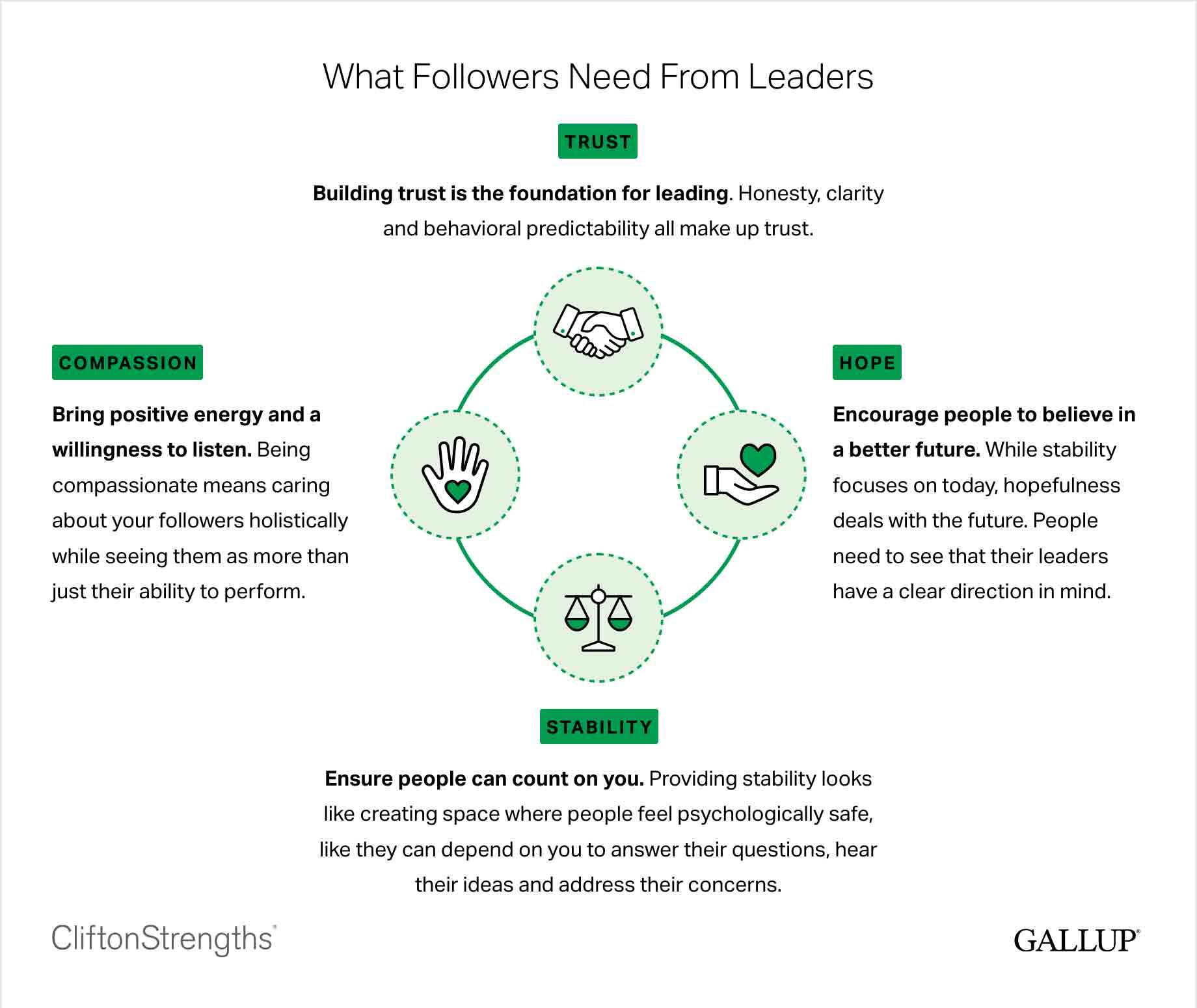
Chart depicting what followers need from their leaders. Trust - Building trust is the foundation for leading. Honestly, clarity and behavioral predictability all make up trust. Hope - Encourage people to believe in a better future. While stability focuses on today, hopefulness deals with future. People need to that their leaders have a clear direction. Stability - Ensure people can count on you. Providing stability looks like creating space where people feel psychologically safe, like they can depend on you to answer their questions, hear their ideas and address their concerns. Compassion - Bring positive energy and a willingness to listen. Being compassionate means caring about your followers holistically while seeing them as more than just their ability to perform.
To practically apply these traits, make them a part of your everyday communication. Every email, conversation, instruction, etc., should be building hope, trust, stability and compassion.
Learn more about these traits of a good leader (also called the "four needs of followers") from Gallup experts.

If you Google "effective leadership skills," "best leadership qualities," "qualities of a good leader" or anything in that ballpark, you'll notice a pattern: Almost every article, website or business leadership skills "solution" is geared toward trying harder and investing in developing weaknesses. Or trying to adopt certain leadership qualities that simply don't come naturally.
This isn't the right way. It doesn't produce long-lasting results.
Great leaders actually start somewhere else: They start with an awareness, of both themselves (through strengths) and their job (their role and expectations). They should begin with a goal in mind, communicate the desired outcomes and then identify where they've had success in the past -- and then consider how they'll use those successes to help them now.
Self-awareness is key in using your strengths . It's hard to use something you're not aware that you have.

Need a place to start for learning how to develop your strengths as a leader?
Check out The CliftonStrengths Podcast.
What all leaders need is a fresh look at the leadership behaviors that actually contribute to performance, development and success.
After you gain an awareness of yourself through your strengths, you need to learn how to apply those strengths to the expectations of your role. Here's a framework for approaching your role with these expectations:
1. Build Relationships.

1 Build relationships.
The concept of "leadership" cannot exist apart from a group of people who need to be led. Simply put, leaders can't lead unless someone follows, which means that building strong relationships is key . People need to connect with each other, share trust and have relationships to thrive. It is important to recognize the value of people, seek to know them for who they are and build lasting connections.
- 2. Develop people.

2 Develop people.
Do the people you're leading, coaching, teaching, etc., feel like they're growing? Most people know that if they're not growing, they're not getting closer to success. Then, it's only a matter of time before they leave -- your organization, your fitness class, your night class -- for someone who gets them closer to their goals. Every day, those people have a chance to either get a little bit better at what they do, or not. Development can, and should, be constant.
- 3. Lead change.

3 Lead change.
The keyword being "lead." Much is expected of you as a leader to keep moving forward, ensuring that the purpose, mission and vision remain the same. It's OK (and good) for you to charge your followers with some responsibility for change -- coming up with good ideas, better ways of doing things or smarter processes -- because it will help them take ownership for helping with the right kind of change. Every individual is able to see an opportunity and take initiative, set a goal and create a plan to get there, but it's your job to set an example for that.
- 4. Inspire others.

4 Inspire others.
Is this trait too "soft" to count as an expectation that's critical to success? Definitely not. Leaders should provide inspiration so that others can find greater meaning in a vision or purpose. Without meaning, and without connecting inspiration to the individuals who follow you, you'll find that those who follow will have a difficult time committing themselves to the greater purpose -- whether that's in your organization, classroom, small group or otherwise. This expectation helps people see that every little thing they do matters.
- 5. Think critically.

5 Think critically.
Aimless decision-making and feeble thinking have no place in leadership. Or, at least, they shouldn't be the type of thinking that influences final decisions. Evaluating plans, understanding risk, organizing thoughts and creating action steps requires leaders to bring their whole selves and think critically . Success requires establishing an aim and devising a comprehensive, multifaceted approach to achieving it.
- 6. Communicate clearly.

6 Communicate clearly.
Learn the best way you communicate , and then learn how others like you to communicate with them. Share information and ideas that matter -- because effective communication means you'll need to convey compelling information that leads to more informed actions and decision-making. Don't think of communication just as telling your followers things, but think of it as sharing information, asking questions, listening and brainstorming. These are all important forms of clear communication in good leadership.
- 7. Create accountability.

7 Create accountability.
Every person is accountable for something. But this is especially true for leaders. Responsibility is expected of you , just as much as it is of those who follow you. You expect the students at your fitness class to bring the right equipment, you expect that your employees are held accountable for their deadlines, and so on. A culture of accountability starts with you. In practice, this may look like openly committing to initiatives, plans or ideas so that everyone knows what you're responsible for. It may also look like you apologizing to those you lead when you drop the ball in a significant way. Accountability creates a better environment for your followers and allows them opportunities to become more efficient and creative through their own responsibilities.
These expectations work in any scenario where there's a leader. No, really -- think about it. CEOs? For sure. Professors or teachers? Definitely. The leader of your small group at church or facilitator of a book club? No doubt.
Being able to do these seven things well can be the biggest differentiator between average leaders and great leaders.

Want to increase your self-awareness and develop as a leader? Download this free activity to connect your natural talents to leadership outcomes -- and discover how you excel as a leader.
You may have wondered, "What type of leader am I?"
There are countless ways you could answer this question. But most people look to academic leadership theories or find a list of leadership personality traits and different leadership styles to try to answer this.
For example, there's transformational leadership or authentic leadership. Well, wait, aren't all leaders supposed to be these two things? Then there's transactional leadership and laissez-faire leadership, or you could be more autocratic or a coaching leader. OK, now I'm really confused .

With many ways to pinpoint your leadership styles or categorize your relationships with your followers, your attempts may leave you feeling discouraged or irritated. But if you're not sure what kind of leader you are, how are you supposed to find support or improve?
Instead, ask yourself a different question: Why and how do I lead?
Most leadership categories are all about how a person behaves when they're leading a group -- when really, you should be focusing on the things that you already know and that are easier to identify: your natural patterns of excellence. These natural strengths tell you more about why you lead the way you do and how you lead best than about what kind of leader you are.

Each leader is naturally drawn to different things, so you may find that more traditional ways of compartmentalizing leadership styles leave you feeling confused. Instead, answer the questions presented by the four domains of leadership below.
Traditional methods of leadership discovery say to choose the statement that best describes you to discover what one specific type of leader you are.
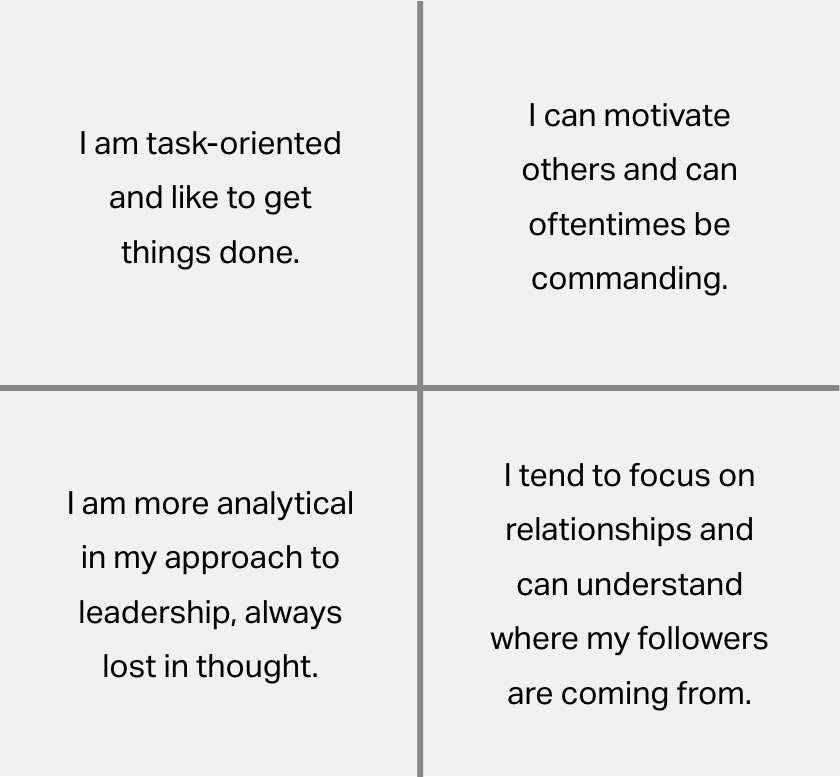
Top Left Quadrant: I am task-oriented and like to get things done. Top Right Quadrant: I can motivate others and can often be commanding. Bottom Left Quadrant: I am more analytical in my approach to leadership, always lost in thought. Bottom Right Quadrant: I tend to focus on relationships and can understand where my followers are coming from.
The four domains of leadership say, "You naturally do all of these things; you just do them differently than others. Let's discover your unique way of leading."
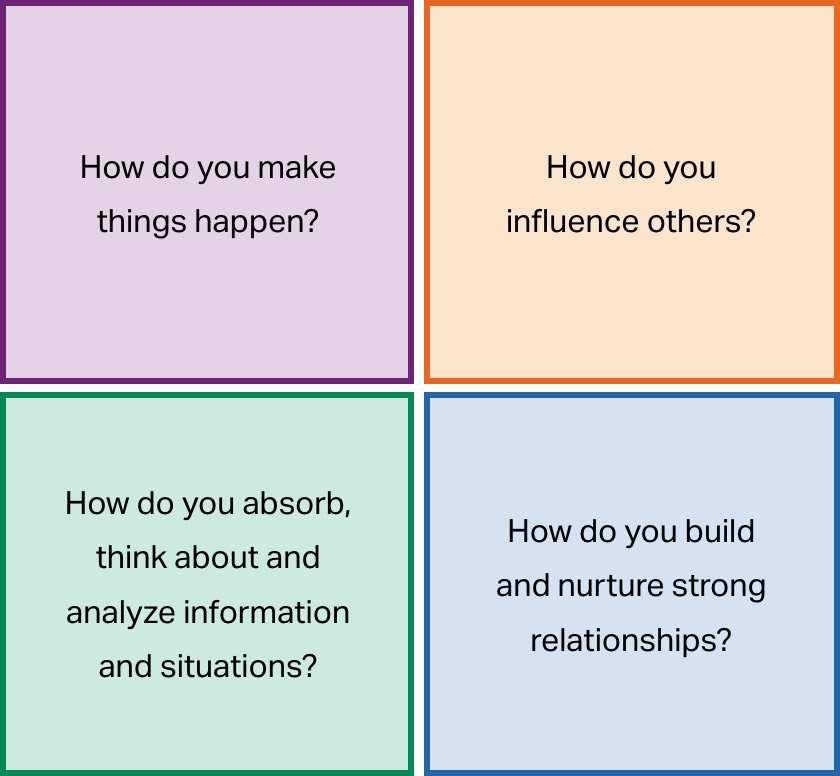
Top Left Quadrant: How do you make things happen? Top Right Quadrant: How do you influence others? Bottom Left Quadrant: How do you absorb, think about and analyze information and situations? Bottom Right Quadrant: How do you build and nurture strong relationships?
The four domains of leadership are a helpful framework because when you search for one specific leadership style, you wind up trying to spend more time categorizing than you do developing.
Traditional leadership styles establish strict boundaries, but the CliftonStrengths domains freely encourage you to cross those boundaries.
Each of the four domains encompasses a set of CliftonStrengths that fit that category. Leaders who know their CliftonStrengths become more effective leaders in a few ways. Knowing their strengths helps them:
- improve their decision-making
- boost their engagement
- increase their productivity
Those who know and use their CliftonStrengths are also:
Simply understanding your strengths makes your life better -- and who wouldn't want to have a higher quality of life and be more effective? Haven't discovered your strengths yet? Get started and take the assessment today .
At the end of the day, leaders and managers are both focused on two things: developing people and delivering team (or organizational) success.
Leadership : Traditionally, leaders have been responsible for creating the overall strategic vision.
Management : Managers are the ones who execute leadership direction and direct teams.
But as the workplace continues to change, the line between the roles of leaders and managers continues to blur.
Driven by the pace of change in globalized business and an evolving workforce that prioritizes development and flexibility, today's business world is agile and dynamic. As a result, a manager's role is far more than supervisory -- and Gallup finds that 70% of the variance in a team's engagement is influenced by the manager . Furthermore, the traditional role of a boss as a command-and-control function does not work for today's workforce.
The expectation is for the manager and leader to be more of a coach than a boss .

- My Paycheck
- My Satisfaction
- My Annual Review
- My Weaknesses

- My Development
- My Ongoing Conversations
- My Strengths
The biggest difference between a leader and a manager is where they fall within an organization. A manager is someone who is usually in charge of leading people, where a leader is in charge of leading the people who lead people. Leaders are more responsible for creating the strategic vision and are a little more removed from the front lines. Managers are more about getting the actual work done.
Success is measured and defined differently by all, which means that good information on how to lead your team to success or understanding what makes a successful team can be hard to find. Before you know how to lead, you need to know what a successful team looks like.
A successful team is a team where individuals are positioned to do what they do best and get the resources and partnerships they need to do their best work.
Leading a successful team requires you to identify the unique contributions that every person on your team makes -- including yourself.
CliftonStrengths makes this easier. Having team members discover, develop and lead with their strengths can lead to higher employee engagement and performance, which are outcomes of a successful team. However, they aren't the most important outcomes because giving your employees the opportunity to do what they do best is the greatest measure of a successful team.

Competition - Winning. Communication - Advocacy. Context - History. Activator - Catalyst. Achiever - Drive. Futuristic - Vision. Harmony - Alignment. Significance - Legacy. Focus - Goals. Analytical - Logic.

Harmony - Alignment. Arranger - Orchestration. Maximizer - Excellence. Relator - Transparency. Input - Resources. Includer - Connection. Analytical - Logic. Positivity - Optimism. Intellection - Reflection. Consistency - Fairness.
To lead a successful team, be willing to admit to your team that you're not great at everything. It's good to acknowledge, and it's even better for your team to hear.
Conventional wisdom says that to become a better leader, you should develop the areas where you are naturally weak. And to be a good leader, you encourage your team to do the same. But CliftonStrengths says you should invest in the places where you're naturally strong.
"Identify the unique contributions that every person on your team makes -- including yourself."
Here's a practical way for you and your team to understand each other's strengths and intentionally aim them at your goal -- the CliftonStrengths Team Grid.
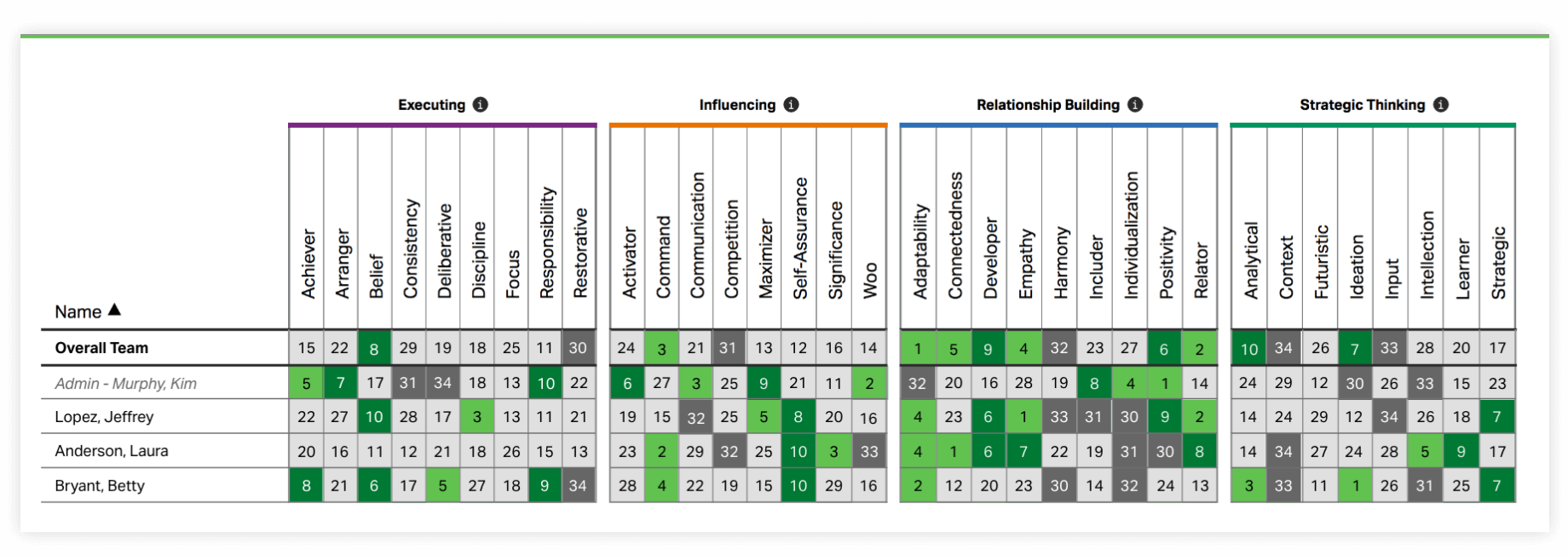
As a leader, you could look at your team's grid to determine who would be good partners to:
- come up with ideas for a new solution to a process
- determine how to make an existing process more efficient
- help gather the latest findings in your industry and analyze them
Knowing the makeup of your team's strengths allows you to lead more confidently because you know how to set each person up for success.

Position individuals to do what they do best, better use each individual's strengths, build more effective partnerships and teams, and then mobilize the team to increase individual and team effectiveness.
For more information about the team grid and bringing strengths to your team, contact us .
If your attempts to develop in the past have fallen short, it may be because too few leadership development programs can clearly define the experiences that lead to excellence in leadership . They don't individualize, they can't match leader to experience at the time it's most needed, and they don't help leaders analyze their experiences so they can effectively apply them in the future.
Don't overcomplicate your development . Start with these three areas:
1 We believe that knowing your strengths is a great foundation for creating a leadership development plan. When you take the CliftonStrengths assessment, you will get a report with personalized results. Discover your natural talents, and then receive the CliftonStrengths for Leaders report with insights and advice based specifically on your results to help you become a better leader. The descriptions of your top strengths, and the order in which they appear, will be unique to you. Because just as we believe that no two leaders lead the same way, we also believe that no two people have the same strengths.
The descriptions of your top strengths, and the order in which they appear, will be unique to you. Because just as we believe that no two leaders lead the same way, we also believe that no two people have the same strengths.
Take the Assessment

2 Take a look at the seven expectations for leaders. If you truly want to develop, those are where you should begin. Start with a self-assessment. At first glance, which one of these core leadership competencies do you do really well? How can you get even better? Then determine which one doesn't come as naturally. How can you use your natural strengths to develop it?
- 1. Build relationships.
For more details, check out the Seven Expectations for Leaders section. And to get started right now, download this free activity to help you develop.
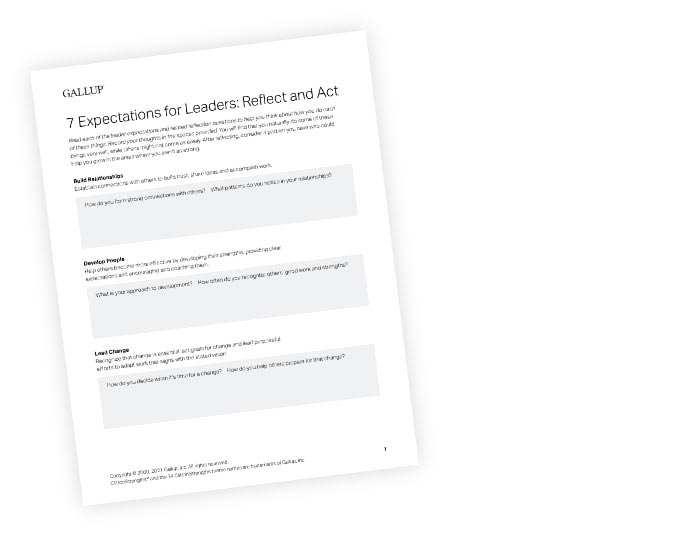
3 Learn to identify your own key experiences, both the ones that got you where you are today and the ones you want to have. Consider your past and present, and decide what you want for your future. Key experiences are some of the most critical components of leader success. Put simply, "Key experiences are events in a leader's life that result in learning, growth and/or increased capacity to effectively lead." Every role and every industry looks different, but key experiences are one of the foundational elements to leadership development anywhere.
Here are a few examples of key experiences that have helped develop leaders in the workplace:
- working on stretch assignments and projects outside of their expertise
- turning around a failing business or product
- leading a cross-functional team on a mission-critical organizational project
- experiencing failure and learning from it
Although those key experiences will look different for each person, you can notice a pattern or commonality between them all. Embracing new situations and being uncomfortable are important parts of developing as a leader . When things look tough, lean in. That's where growth happens.
Your time is best spent when you're sharpening your skills and honing your talents. Stop worrying about what you're bad at, and start working harder at developing what you're good at.

CliftonStrengths for Leaders

CliftonStrengths Articles and Videos

Leadership Videos

CliftonStrengths Newsletter

Development for Leaders

Workplace Insights

Leading with Strengths

The CliftonStrengths Podcast

Leading With Strengths
Watch interviews with leaders from around the world as they reveal the hidden layers of their own unique strengths and how they’ve used them to be successful.

What makes a good PhD supervisor? Top tips for managing the student-supervisor relationship.
Jan 8, 2020

When I started my PhD, the entire cohort of incoming students had an induction session in the university’s great hall. There were around 500 of us, from every department and every imaginable discipline.
The induction itself was tedious, but there was one comment in particular that stood out immediately and stuck with me throughout my entire PhD journey. When a professor was asked in a Q&A what advice he would give incoming PhD students, he said to remember that, after your mother, your supervisor will be the most important person in your life.
Interested in group workshops, cohort-courses and a free PhD learning & support community?

The team behind The PhD Proofreaders have launched The PhD People, a free learning and community platform for PhD students. Connect, share and learn with other students, and boost your skills with cohort-based workshops and courses.
Now I’m at the other end of the PhD and I’ve graduated, I’ve got some advice of my own to add to his. You see, the professor overlooked something really important, and that is that, by the time we were sitting in the induction, we had already chosen our supervisors (or had them assigned, as in my case).
Why should that matter? Primarily because whether or not your supervisor becomes the most important person in your life depends how good that supervisor actually is, how well they are executing their duties, and how well you are managing the student-supervisor relationship.
In this guide, I want to dig in a little more into what makes a good supervisor, before discussing what they should and shouldn’t be doing, why you need to please them (and how you can go about doing so), and how to make the
How to choose a PhD supervisor
The most important piece of advice for someone about to embark on a PhD and looking for a potential supervisor is to actually make an effort to talk to them about your research proposal.
Now, for many, your potential supervisor may be someone you already know, such as a lecturer, Master’s dissertation supervisor or tutor. Or, it may be someone from your department who you don’t know so well, but whose work fits your research interests.
In either case, chances are you’ve interacted with them in a teacher-student kind of relationship, where they lecture and you take notes. Well, when thinking about your PhD and their role as a potential supervisor, it’s time to put on a different hat and approach them as a peer. Email them or call them and schedule a phone call or face-to-face meeting to talk about your proposal and solicit their advice. Be explicit about wanting them to supervise you and tell them why. They won’t bite. In all likelihood, they’ll be flattered.
Now, the same applies even if it’s someone you don’t know or have never interacted with (perhaps if it’s someone from a different university or country). Approach them, explain what you intend to do and tell them exactly why you think they should supervise you.
As you ask these questions, you’ll get a pretty good idea of what to look for in a potential supervisor. For one, their research interests need to align with yours. The closer they align the better. But, more than that, you need to consider whether they have published in your field (and whether they’re continuing to do so).
Often, though, the more high-profile academics will already be supervising a number of students. Try, if you can, to get an idea of how many PhD students they are currently supervising. This will give you a good idea of whether they’ll have the time required to nurture your project over the years it will take you to complete it, or whether they’ll be stretched too thin. Also, look at how many students they have supervised in the past and how many of them completed successfully. This will give you a good insight into their experience and competence.
Remember back to that advice I got on my first day: the person you’re choosing to supervise your study will become the most important person in your life, so you need to consider the personal dimension too. Do you actually get on with them? You’ll be spending a lot of time together, and some of it will be when you’re at your most vulnerable (such as when you’re stressed, under incredible pressure or breaking down as the PhD blues get the better of you). Do you think this person is someone with whom you can have a good, friendly relationship? Can you talk openly to them? Will they be there for you when you need them and, more importantly, will you be able to ask them to be?
Once you’ve considered all this, don’t be afraid to approach them at a conference, swing by their office, drop them an email or phone them and run your project by them. The worst they can do is say no, and if they do they’ll likely give you great feedback and advice that you can take to another potential supervisor. But they may just turn around and say yes, and if you’ve done your homework properly, you’ll have a great foundation from which to start your PhD-journey. They’ll also likely work with you to craft your draft proposal into something that is more likely to be accepted.

Your PhD Thesis. On one page.
Use our free PhD Structure Template to quickly visualise every element of your thesis.
What is the role of a supervisor?
Think of your supervisor like a lawyer. They are there to advise you on the best course of action as you navigate your PhD journey, but ultimately, the decisions you make are yours and you’re accountable for the form and direction your PhD takes.
In other words: they advise, you decide.
I appreciate that is vague, though. What do they advise on?
Primarily, their job is:
8. To a certain extent, they often provide emotional and pastoral support
How many of these jobs they actually do will vary from supervisor to supervisor. You have to remember that academics, particularly those that are well known in their field, are often extremely busy and in many cases overworked and underpaid. They may simply not have the time to do all the things they are supposed to. Or, it may be the case that they simply don’t need to because you already have a good handle on things.
What does a supervisor not do?
Your supervisor is not there to design your research for you, or to plan, structure or write your thesis. Remember, they advise and you decide. It’s you that’s coming up with the ideas, the plans, the outlines and the chapters. It’s their job to feedback on them. Not the other way around.
Unlike at undergraduate or masters level, their job isn’t to teach you in the traditional sense, and you aren’t a student in the traditional sense either. The onus is on you to do the work and take the lead on your project. That means that if something isn’t clear, or you need help with, say, a chapter outline, it is up to you to solicit that advice from your supervisor or elsewhere. They won’t hold your hand and guide you unless you ask them to.
Having said that, their job isn’t to nanny you. At PhD level it is expected that you can work independently and can self-motivate. It is not your supervisor’s job to chase you for chapter drafts or to motivate you to work. If you don’t do the work when you’re supposed to then it’s your problem, not theirs.
It’s also not their job to proofread or edit your work. In fact, if you’re handing in drafts that contain substantial fluency or language issues (say, if you’re a non-native English speaker), it’s likely to annoy them, particularly if you’re doing so at the later stages of the PhD, because they’ll have to spend as much time focusing on how you’re writing as they do on what you’re writing.
More troubling would be if you explicitly ask them to correct or edit the language. They won’t do this and will take a dim view of being asked. Instead, hire a proofreader or ask a friend with good writing skills to take a read through and correct any obvious language errors (check the rules laid out by your university to see what a proofreader can and cannot do though. As with everything in your PhD, the onus is on you to do things properly).
What you need to do to please your supervisor
The lines between what your supervisor will and will not do for you are blurred, and come down in large part to how much they like you. That means you should pay attention to pleasing them, or at least not actively irritating them.
There are a few simple things you can do that will make their life easier and, with that, boost their opinion of you and their willingness to go beyond their prescribed role.
First, and by this stage you shouldn’t need to be told this, meet deadlines, submit work to them when you said you would, and turn up to your supervision meetings on time. If you meet the deadlines you’ve set, they’re more likely to return work quicker and spend more time reading it prior to doing so.
Wrapping up
Managed well, you too can ensure that your supervisor is the most important person in your life. And you want them to be. Those who succeed in their PhDs and in their early academic careers are those who had effective supervision and approached their supervisor as a mentor.
Things don’t always go according to plan, though, and sometimes even with the best will in the world, supervisors under-perform, create problems or, in more extreme cases, sabotage PhD projects. This can be for a variety of reasons, but it leaves students in a difficult position; in the student-supervisor relationship, the student is relatively powerless, particularly if the supervisor is well known and highly esteemed. If this is the case, when things don’t go well, raising concerns with relevant channels may prove ineffective, and may even create more problems. In these extreme cases, you’ll have to draw on levels of diplomacy and patience you may never have known you had.
Hello, Doctor…
Sounds good, doesn’t it? Be able to call yourself Doctor sooner with our five-star rated How to Write A PhD email-course. Learn everything your supervisor should have taught you about planning and completing a PhD.
Now half price. Join hundreds of other students and become a better thesis writer, or your money back.
Share this:
10 comments.
I am very grateful for your interesting and valuable advice here. Thank you very much!
Thanks for the kind words.
Though my PhD journey is still in an infancy stage, i can’t thank you enough for the wisdom, motivation and upliftment shared….thank you, i earnestly appreciate it.
You’re very kind. It’s my aim to help others and make their lives easier than mine was when I was doing my PhD. To hear that it’s working fills me with a lot of joy.
I am grateful for this e-mail. I really appreciate and I have learnt a lot about how to build a fruitful relationship with my supervisor.
Thank you again for your notable contribution to our PhD journey.
You’re very welcome. Thanks for reading.
I’m looking to doing a PhD research and believe your service and material would be very useful. It am in the process of applying for a place at SOAS and hope to be offered the opportunity. I anticipation of this I’m currently investigating and making notes to all the support I’ll need. The challenge for me is I’ll be 69 years old in November and into my 70s in three years time, and would need all the support and encouragement available.
So wish me luck.
Thanks for the comment. What you bring with you is experience and expertise. That will serve you well as you go through the PhD journey. Good luck!
Thank you so much for the valuable advice. I really appreciate your motivation and guidance regarding the PhD journey. Iam a second year PhD student with the University of South Africa and l think your words of wisdom will help me to maintain a friendly relationship with my supervisor until graduation. I thank you
You’re very welcome. I’m glad you’re finding what we do here useful. Keep up the good work.
Submit a Comment Cancel reply
Your email address will not be published. Required fields are marked *

Search The PhD Knowledge Base
Most popular articles from the phd knowlege base.
The PhD Knowledge Base Categories
- Your PhD and Covid
- Mastering your theory and literature review chapters
- How to structure and write every chapter of the PhD
- How to stay motivated and productive
- Techniques to improve your writing and fluency
- Advice on maintaining good mental health
- Resources designed for non-native English speakers
- PhD Writing Template
- Explore our back-catalogue of motivational advice
- Undergraduate
- High School
- Architecture
- American History
- Asian History
- Antique Literature
- American Literature
- Asian Literature
- Classic English Literature
- World Literature
- Creative Writing
- Linguistics
- Criminal Justice
- Legal Issues
- Anthropology
- Archaeology
- Political Science
- World Affairs
- African-American Studies
- East European Studies
- Latin-American Studies
- Native-American Studies
- West European Studies
- Family and Consumer Science
- Social Issues
- Women and Gender Studies
- Social Work
- Natural Sciences
- Pharmacology
- Earth science
- Agriculture
- Agricultural Studies
- Computer Science
- IT Management
- Mathematics
- Investments
- Engineering and Technology
- Engineering
- Aeronautics
- Medicine and Health
- Alternative Medicine
- Communications and Media
- Advertising
- Communication Strategies
- Public Relations
- Educational Theories
- Teacher's Career
- Chicago/Turabian
- Company Analysis
- Education Theories
- Shakespeare
- Canadian Studies
- Food Safety
- Relation of Global Warming and Extreme Weather Condition
- Movie Review
- Admission Essay
- Annotated Bibliography
- Application Essay
- Article Critique
- Article Review
- Article Writing
- Book Review
- Business Plan
- Business Proposal
- Capstone Project
- Cover Letter
- Creative Essay
- Dissertation
- Dissertation - Abstract
- Dissertation - Conclusion
- Dissertation - Discussion
- Dissertation - Hypothesis
- Dissertation - Introduction
- Dissertation - Literature
- Dissertation - Methodology
- Dissertation - Results
- GCSE Coursework
- Grant Proposal
- Marketing Plan
- Multiple Choice Quiz
- Personal Statement
- Power Point Presentation
- Power Point Presentation With Speaker Notes
- Questionnaire
- Reaction Paper
- Research Paper
- Research Proposal
- SWOT analysis
- Thesis Paper
- Online Quiz
- Literature Review
- Movie Analysis
- Statistics problem
- Math Problem
- All papers examples
- How It Works
- Money Back Policy
- Terms of Use
- Privacy Policy
- We Are Hiring
The Role of the Supervisor, Essay Example
Pages: 2
Words: 645
Hire a Writer for Custom Essay
Use 10% Off Discount: "custom10" in 1 Click 👇
You are free to use it as an inspiration or a source for your own work.
Managing an organization requires great skills, and managing a successful organization requires exceptional skills. When executives seek to hire supervisors they must look for individuals that have the required skills that help manage and run an organization effectively and efficiently. In order to be a successful supervisor, individuals must possess the ability to have fine balance of requiring high work performance and meeting the needs of the diverse workforce. In uncertain times within an organization there are several challenges and rewards that help to balance the roles of the supervisor. The challenges include working with diverse people, and getting them to all work tougher. Supervisor that seek to climb the management hierarchy acquire the responsibility of having an unpredictable job facing organizational conflicts and pressures from their job. Just like the employees they manage, supervisors report to their own managers in the higher positions, and must learn to cooperate with supervisors in other departments. In order to be a successful supervisor, the role requires many skills that help to manage a diverse workforce, relationships with other employees, and streamline operations for the organization.
The eight major classification of management skills are that supervisors must possess technical skills which gives them the ability to do their jobs; human relations skills that are required to work well with others; communication skills which enables them to give and get information; administrative skills that is required when organizing, planning, and coordinating activities. Supervisors must also possess conceptual skills that is pertinent in obtaining, interpreting, and applying information within the job; leadership skills that allows for engagement with employees in all aspects of the organization; political skills that allows supervisors to connect with various channels; emotional intelligence that is essential in being able to use emotions intelligently especially in unpredictable situations. These skills are coupled with other essential skills that make the right individual a successful supervisor.
The skills I feel that I possess and are strong in is administrative skills because I have the ability to plan, organize, and coordinate activities. Fayol writes that the five functions of management are to plan which sets a course of action; organize that that aids in designing the structure that clearly defines authority and tasks; commanding that gives directions to subordinates; coordinating which organizes different elements for a common objective; controlling that makes sure that plans are carried out. (Fayol 2013) Other strong skills include, communication skills in accordance skills that allow for me to be able to access various channels and effectively give and get information from subordinates and other employees. Technical skills that enable me to get the job done the right way, and human relations skills that managers are able strive to improve productivity and working conditions. (Leonard 2013)
There are areas where not weak, some skills can be improved on which include leadership skills that are essential in being able to leader and engage others in all aspects of the organization. Leaders are not born but are taught and conditioned to be great, in order to be a great supervisor I have to improve on leadership skills. Leonard implies that managerial skills can be learnable and with continued practiced in the role, managers can improve and sharpen their skills. (Leonard 2013). Conceptual skills are skills that gives me the ability to interpret and apply information throughout the organization. In order to improve these skills they must be applied every day in order to provide the right information. Another skill to improve is emotional intelligence that enables me to control and use my emotions in way that influences others. Supervisors carry great responsibility, and the role of superiors requires much skill and practice, but when the right individuals possesses these skill the organization will succeed.
Fayol, Henri. (2013). What are Henri Fayol’s 5 functions of management? Business Mate Retrieved from http://www.businessmate.org/Article.php?ArtikelId=228
Leonard, Edwin C. (2013) Supervision: Concepts and Practices of Management . Cengage Learning
Stuck with your Essay?
Get in touch with one of our experts for instant help!
Demand for Engineers, Essay Example
Culture Shock, Essay Example
Time is precious
don’t waste it!
Plagiarism-free guarantee
Privacy guarantee
Secure checkout
Money back guarantee

Related Essay Samples & Examples
Voting as a civic responsibility, essay example.
Pages: 1
Words: 287
Utilitarianism and Its Applications, Essay Example
Words: 356
The Age-Related Changes of the Older Person, Essay Example
Words: 448
The Problems ESOL Teachers Face, Essay Example
Pages: 8
Words: 2293
Should English Be the Primary Language? Essay Example
Pages: 4
Words: 999
The Term “Social Construction of Reality”, Essay Example
Words: 371
Exploring My Motivations for Pursuing a Supervisory Role
Being a supervisor is an essential role in any organization, requiring a responsible and dedicated individual. Students considering this position should consider its numerous benefits, such as leadership development, career advancement, and personal growth. Taking on this role can help students to achieve their goals and become successful in the professional world.
Becoming a supervisor also requires commitment and hard work, but with dedication, one can reap the rewards of this position. An essay with custom writing on this topic should explore these advantages as well as the numerous responsibilities associated with being a supervisor. It should provide an insightful look at how students can benefit from taking on this role while emphasizing the importance of being well-equipped for the responsibilities that come with it.
Why Do I Want to Be a Supervisor Essay
Developing my leadership skills is a primary motivator for me, as I believe that effective leadership is a key factor in achieving success in any field. As a supervisor, I would have the opportunity to practice and enhance my leadership abilities by guiding and managing a team towards a common goal. This experience would be invaluable for my personal and professional growth, helping me to develop essential skills such as communication, delegation, and problem-solving.
Gaining Valuable Management Experience
I am also eager to gain experience in different areas of the workforce. Becoming a supervisor would allow me to gain exposure to various aspects of business management, such as planning, organization, and decision-making. This experience would be highly valuable as I progress in my career and seek further leadership positions. Additionally, as a supervisor, I would have the opportunity to develop my mentoring and coaching skills by guiding my team towards their professional goals.
Exploring the Benefits of Becoming a Supervisor
Taking on increased responsibility as a supervisor would give me a chance to hone my problem-solving and decision-making skills, which are essential for any future leadership position. Additionally, the role provides a level of job security as becoming a valuable asset to the company would make it less likely for me to be laid off or downsized in the future.
Exploring the Financial Incentives of Becoming a Supervisor
I recognize the importance of financial stability and security in the workforce. The prospect of a higher salary and bonuses can serve as a strong motivator for me to work hard and achieve success as a supervisor. Moreover, the financial incentives associated with becoming a supervisor can provide me with the means to invest in my personal and professional growth, such as pursuing further education or training opportunities. This financial stability can also help me to achieve my long-term career goals, such as saving for a down payment on a house or starting my own business.
Understanding the Job Security Benefits of Becoming a Supervisor
In addition to the financial incentives, the role of a supervisor also offers increased job security, which is highly valued in today’s economy. By taking on a leadership role and demonstrating my commitment to my organization, I can increase my chances of retaining my job in the face of downsizing or other economic challenges. Furthermore, the skills and experience I gain as a supervisor can make me more marketable in the job market, increasing my chances of finding employment should I ever need to change jobs or industries. Ultimately, the job security benefits of becoming a supervisor can provide me with peace of mind and a sense of stability as I navigate my career.
My desire to become a supervisor stems from a combination of personal and professional reasons. I see it as a means of developing my skills, advancing my career prospects, making a positive impact, and achieving greater job security. By taking on this role, I believe I can become a more effective and inspiring leader, and contribute to my team’s and organization’s success. My desire to become a supervisor is driven by my aspiration to develop my leadership skills, gain valuable management experience, and advance my career prospects. The opportunity to make a positive impact on my team and organization, as well as the potential for increased financial incentives and job security, further motivates me to pursue this role.
Tips on Writing Why I Want to Become a Supervisor Essay
Crafting a compelling why do you want to be a supervisor essay can seem daunting, as you must articulate your motivations in a way that persuades the admissions committee that you possess the necessary qualities for the position. By following these tips and incorporating personal statements examples for students , you can craft a compelling essay that showcases your unique strengths and qualities as a potential supervisor.
Past Experiences to Demonstrate Leadership Skills
Use concrete examples from your past experiences to support your claims. This could include leadership roles you’ve held, projects you’ve managed, or other accomplishments that demonstrate your ability to lead and manage others.
Provide More Details
Be specific about your reasons for wanting to become a supervisor. Avoid generalizations and, instead, focus on the skills and experiences that make you a good fit for the role.
Why You’ve Suited for a Supervisor Position
Showcase your passion for the industry and your commitment to personal and professional growth. Admissions committees want to see that you’re invested in your career and that you’re willing to put in the effort to succeed.
Crafting a Conclusion
End with a strong conclusion that ties your essay together and leaves a lasting impression. Consider ending with a call to action how to become a good supervisor or a statement that highlights your enthusiasm for the opportunity to become a supervisor.
Related posts:
- What Does Rain Symbolize in Literature
- Healing with Heart: Essay About My Plans to Becoming a Doctor
- Why I Want to Become a Counselor, Essay Sample
- Democracy in Question: Should The Electoral College be Abolished Essay
Improve your writing with our guides

Youth Culture Essay Prompt and Discussion

Why Should College Athletes Be Paid, Essay Sample

Reasons Why Minimum Wage Should Be Raised Essay: Benefits for Workers, Society, and The Economy
Get 15% off your first order with edusson.
Connect with a professional writer within minutes by placing your first order. No matter the subject, difficulty, academic level or document type, our writers have the skills to complete it.
100% privacy. No spam ever.


- Buy Essays Online
- Buy admission essay
- College Essay Writing Service
- Economics essay writing service
- Law essay writing service
- College paper writing service
- Research paper writing service
- Term paper writing service
- PowerPoint presentation homework help
- Write my book report
- Assignment writing service
- Lab report writing service
- Programming assignment help
- Statistics assignment help
- Article Critique
- Annotated bibliography writing service
- Case study writing service
- Coursework writing service
- Dissertation Writing Services
- Speech writing service
- Thesis writing help
A good supervisor

We all know when we have a good supervisor, but it can be quite difficult to actually state what makes a good supervisor good. Is it to do with their personality, their insight, intelligence, reasoning, or their personal beliefs, morals and values? Is it a mix of all these things, and do certain characteristics apply more than others? As we sit to think about this daunting question, the first thing we should appreciate is that there are a huge amount of traits that need to be considered. In the interests of not writing an entire novel, i will be focusing on a few select traits which i believe to be the most important in regards to being a good supervisor.
Firstly, a good supervisor must be (or at least act like) a good coach. For a supervisor to be successful, it is imperative that they have the qualities that we ascribe to any normal coach. This is because a coach knows how important it is to coach their team, or in this case, employees. Successful coaching means working together with your subordinates to create and modify action plans and objectives. Supervisors must know how to delegate tasks between individuals, and give all the support and guidance that may be needed. On the topic of individuals, a good supervisor must understand that everybody is different, and to be mindful of this fact when dealing with his or her team members.
Secondly, a good supervisor must have a positive outlook and be a positive thinker. He or she will think how problems can be solved, while maintaining an air of amiability, so that they remain approachable, and their subordinates or not fearful or tiresome of them. This is very important, because if an employee comes up against a problem, having an approachable supervisor will make solving the problem so much more quick and easy than otherwise. Additionally, a good supervisor's qualities of positivity will make other employees think positively, improving morale.
Thirdly, a good supervisor must be an advocate for his or her subordinates, and be fully accountable for the actions of all team members. They should have the resolve to stand up for their team, and recognize hard work when they see it, and not be afraid to punish those who do not behave appropriately. If a given employee is worthy of promotion, then the supervisor most support his or her case to the manager. The supervisor is in a unique position - in a position of authority similar to a manager, but more approachable and with the ability to speak more freely and informally.
In conclusion, a good supervisor certainly requires all the traits mentioned above. Such a supervisor will radiate positivity, leadership and confidence, setting the right example to the employees. A genuine concern and love for the job, the tasks at hand, and the employees is what is needed, and to lean more to the friendship side of things, rather than the managerial side.
- Paper writing service
- Term paper help
- Dissertation writing services
- Amendments $30
- Title page $5
- Bibliography $5
- E-mail delivery $10
- Formatting $10
- Plagiarism check of each writer
- True Quality
- Guaranteed Privacy
- Satisfaction guarantee
- On time delivery
- No hidden charges
- 24/7 Live Support

Unique offer for a first-time customer
Send us your email and receive it
Done! Check your email for the discount
Check Promotions and Spam folders if you can`t find the letter.
We use cookies. What does it mean? OK

IMAGES
VIDEO
COMMENTS
Give employees feedback on their performance. Solve workplace challenges or conflicts. Convey department goals and targets to their team. Communicate updates and status reports to upper management. A successful supervisor is a good collaborator who communicates well and is comfortable taking the role of a leader.
A good supervisor is frequently accountable and in authority to stand for the requests of the employees and to management, together with standing for the case of the employees for deserving a reward. An example for this is, if a certain worker or an employee is worthy to be promoted, the supervisor frequently must support and defend the case ...
Discover the essential qualities of a highly effective supervisor in this comprehensive guide. Learn how great leaders foster growth, communicate effectively, empower their teams, and balance guidance with autonomy. Plus, explore the roles empathy, understanding, and commitment to employee development play in building a resilient, high-performing team.
Conflict can happen in a work environment. A good manager recognizes this and creates an effective method of minimizing friction and dealing with it when it takes place. Being a good listener and mediator is also vital in tricky situations. Strong Leadership. The supervisor should serve as an example to their staff.
That means, taking ownership of meeting your teams' physical, emotional, and environmental needs and getting to the root cause of the underlying issues. Take the lead: Not everyone on your team ...
Emotional intelligence is the ability to perceive, control, and assess emotions. As a supervisor, possessing high emotional intelligence can significantly improve your team's morale and productivity. 7. Empathy. Empathy means understanding the feelings of others and responding with care.
1. Learn about the responsibilities of the role. The first step in becoming a good supervisor is to understand the scope and responsibilities of the position. For instance, your tasks may include quarterly reviews for employee feedback, long-term planning, and outlining team and company goals. Depending on the structure of the team and the job ...
1165 Words. 5 Pages. Open Document. A good supervisor will inspire, challenge, and motivate their employees. In addition, a supervisor has the ability to stay focused and is able see the big picture. However, one could possibly argue that the best quality that a good supervisor must possess is the skill to recognize the potential in others.
5. Be accountable. As the supervisor, you are responsible for your whole team. If you miss a deadline or lose a client, don't point fingers and blame others for the mistake. Instead, evaluate the role you played, admit your own mistakes, and come up with a plan to avoid making the same mistakes in the future.
A supervisor should always strive to be as ethical and moral in his decisions as possible. This will lead his subordinates to respect his decisions more often even if they do not always agree with him. Another characteristic of a respectable supervisor is his ability to perform even the most menial of tasks to help gain the respect of his ...
Historically, initial roles and functions of a supervisor were to oversee the working of other employees, give instructions on how a task was to be carried out and also ensure that instructions were followed to the letter (Uniquetrainingvideos, 2010a). We will write a custom essay on your topic.
See why leading organizations rely on MasterClass for learning & development. Leaders in supervisory positions must make challenging decisions that a regular employee would never confront. To thrive in their position, great leaders must develop nine supervisory skills.
Supervisors' Duties and Qualities Essay. Supervisors form an important part of organizations since they are tasked with overseeing and guiding junior staff to achieve set objectives. Therefore, an effective supervisor should be able to demonstrate leadership skills by bringing employees together to work as a team.
Conventional wisdom says that to become a better leader, you should develop the areas where you are naturally weak. And to be a good leader, you encourage your team to do the same. But ...
Effective supervision has multiple benefits for both the supervisee and supervisor. It can also have significant benefits for the wider service and service users. Below are some examples of the benefits that supervision can have for your professional practice. Click on each of the sections for more information.
Whether you've got a good supervisor or a poor one, it's your PhD and it's down to you not just to get the work done, but to manage the way you approach your supervisor as best you can. Life isn't perfect, and nor is every student-supervisor relationship, but it's down to you to work with what you've got and do so creatively in ...
4. Demonstrate a management mindset. Supervisor roles come with a lot of responsibility, so it's a good idea to recognize this fact when discussing why you want to be a manager. You can do this by talking about your management philosophy and the leadership strategies that you would implement for a team to become more profitable and productive.
In order to be a successful supervisor, the role requires many skills that help to manage a diverse workforce, relationships with other employees, and streamline operations for the organization. The eight major classification of management skills are that supervisors must possess technical skills which gives them the ability to do their jobs ...
Conclusion. My desire to become a supervisor stems from a combination of personal and professional reasons. I see it as a means of developing my skills, advancing my career prospects, making a positive impact, and achieving greater job security. By taking on this role, I believe I can become a more effective and inspiring leader, and contribute ...
Firstly, a good supervisor must be (or at least act like) a good coach. For a supervisor to be successful, it is imperative that they have the qualities that we ascribe to any normal coach. This is because a coach knows how important it is to coach their team, or in this case, employees. Successful coaching means working together with your ...
Here's a list of nice things you can say about your manager during a review: 1. "Thanks for creating actionable goals for the team". It's the responsibility of management to set goals for projects to help guide employees in performing their tasks. You can compliment your manager's ability to set goals for you and your team in a review.
Or Hire Our Professional Writers. 15% First Time Discount. Fill out our order form with detailed instructions and give us some time for writing magic. Get Custom Essay from: 12.93$. Order now. Why I Want to Be a Supervisor (Essay Samples) 2022/03/14 by Simon White Free Essay Samples. Last modified on March 24th, 2022.
The role of the supervisor: As counselors and supervisors, we are trained to ensure that the ethical values of Beneficence and non-maleficence are maintained for all clients. My role as a supervisor is hierarchical or collaborative depending on the level of training of the supervisee. Just as counselors go through stages of development, so do ...